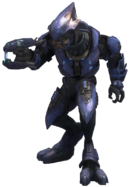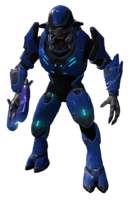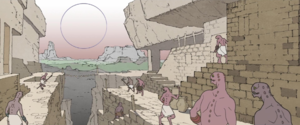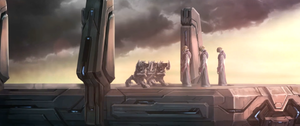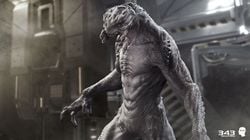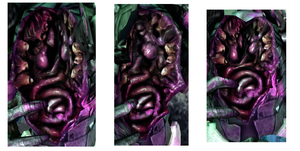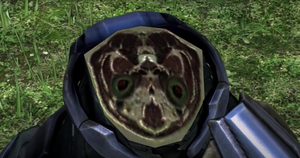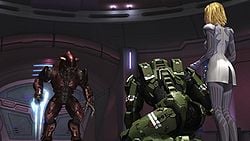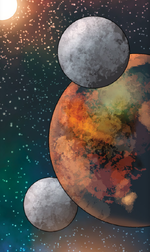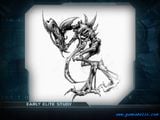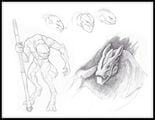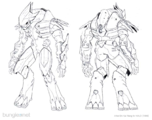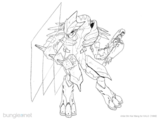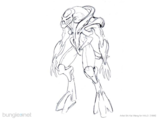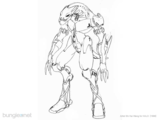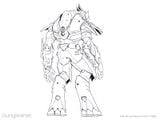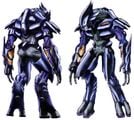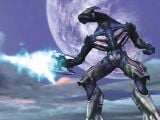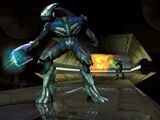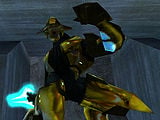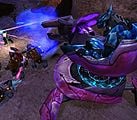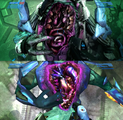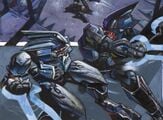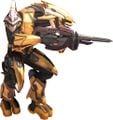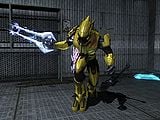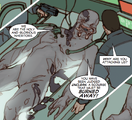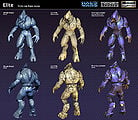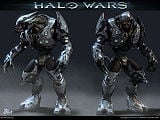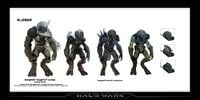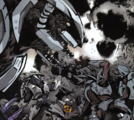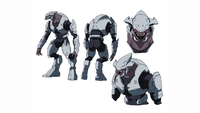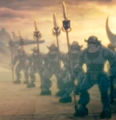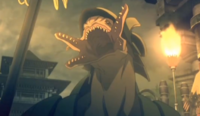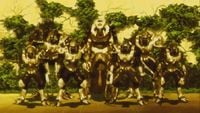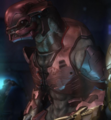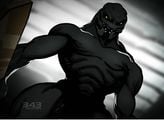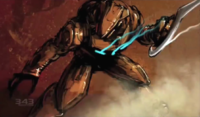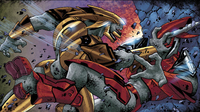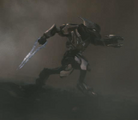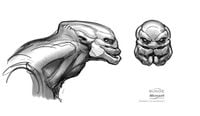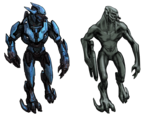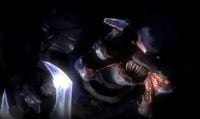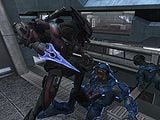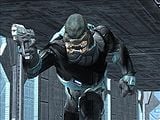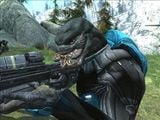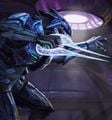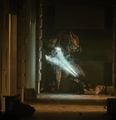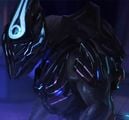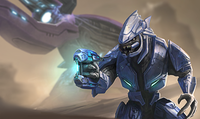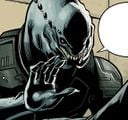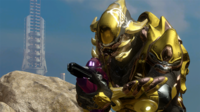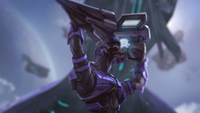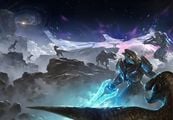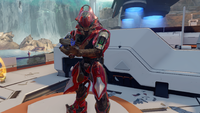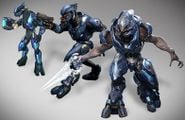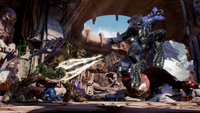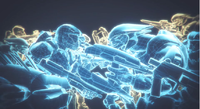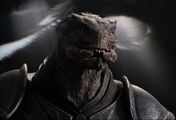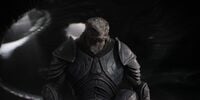Sangheili: Difference between revisions
From Halopedia, the Halo wiki
Spriggsrules (talk | contribs) (→Trivia) |
Sith Venator (talk | contribs) |
||
| Line 1: | Line 1: | ||
{{ | {{Status|Canon}} | ||
{{ | {{disambig header|the saurian species|their language|Sangheili (language)}} | ||
{{ | {{Species infobox | ||
|name=Sangheili | |||
|image=[[File:Elite minor render.png|130px|left]][[File:H2A Sangheili-Minor.png|130px|right]]{{clear}}[[File:H5G-Render-SangheiliStorm.png|240px]]<br>Various Sangheili phenotypes (not to scale) | |||
|latin=''Macto cognatus'' | |||
| | |classification=Saurian | ||
| | |subspecies= | ||
|diet=Omnivorous | |||
|height=225–262 cm (7 ft 4 in–8 ft 6 in)<ref name="VIS">'''[[Halo: The Essential Visual Guide]]''', ''page 61''</ref><ref name="Library">'''[[Halo: Combat Evolved Anniversary]]''', ''[[Library (feature)|Library]]''</ref> | |||
|weight=139–178 kg (307–393 lb){{Ref/Reuse|VIS}} | |||
|distinctions=Humanoid reptilian body structure; quadruple-hinged mandibles; binary circulatory system | |||
|homeworld=[[Sanghelios]] | |homeworld=[[Sanghelios]] | ||
| | |techlevel=Tier 2 | ||
| | |notable-person=*[[Thel 'Vadam]] | ||
*[[Let 'Volir]] | |||
*[[Jul 'Mdama]] | |||
*[[Merg Vol]] | |||
*[[ | *[[Jega 'Rdomnai]] | ||
*[[ | *[[Avu Med 'Telcam]] | ||
*[[ | *[[Fal 'Chavamee]] | ||
*[[ | *[[Ripa 'Moramee]] | ||
*[[ | |||
*[[ | |||
*[[Sesa 'Refumee]] | *[[Sesa 'Refumee]] | ||
*[[Xytan 'Jar Wattinree]] | *[[Xytan 'Jar Wattinree]] | ||
*[[ | *[[Rtas 'Vadum]] | ||
*[[ | *[[Zuka 'Zamamee]] | ||
|othernames=*Elite | *[[Ussa 'Xellus]] | ||
*Split | *[[Inka 'Saham]] | ||
*Squid head | *[[Thav 'Sebarim]] | ||
* | *[[Okro 'Vagaduun]] | ||
* | *[[Ordo 'Mal]] | ||
*[[Chak 'Lok]] | |||
|othernames=*Elite | |||
*Split Chin | |||
*Split Jaw | |||
*Split Lip | |||
*Squid Head | |||
*Alligator<ref>'''[[Halo: Evolutions]]''' - ''[[Headhunters (short story)|Headhunters]]''</ref> | |||
*Hinge-head<ref>''[[Kilo-Five Trilogy]]''</ref><ref>'''[[Halo 4]]''', ''[[Spartan Ops]]''</ref><ref>'''[[Hunt the Truth]]''', ''Xenophobia''</ref> | |||
*Four-jaws {{c|among [[Kig-Yar]]}} | |||
*Boss flappy mouths<ref>[[Halo 5: Guardians]] [[Hamyap]]</ref> | |||
|languages=[[Sangheili (language)|Sangheili]] | |||
}} | }} | ||
{{Series/Species/Sangheili}} | |||
{{Quote|On the blood of our fathers, on the blood of our sons, we swore to uphold the Covenant!|[[Rtas 'Vadumee]] before the [[raid on the Threshold gas mine]].<ref name="H2Arbiter">'''[[Halo 2]]''', campaign level ''[[The Arbiter]]''</ref>}} | |||
The '''Sangheili'''<ref>'''Halo: Ghosts of Onyx''', ''page 189'' (''"Sangheili: the Elite name for their race"'')</ref> ('''Macto cognatus''' in Latin taxonomy,<ref name="Bestiarum">'''[[Bestiarum]]'''</ref> meaning "I glorify my kin") are a saurian<ref>[http://halo.bungie.net/projects/reach/article.aspx?ucc=enemies&cid=24611 '''Bungie.net''': ''Halo: Reach: Enemies - Elite'']</ref> sapient species known for their warrior culture and combat skill. Named after their home planet, [[Sanghelios]], they have historically been known to [[human]]s as '''Elites''' for their former role in the [[Covenant]]'s [[Covenant military|military]] hierarchy.<ref name="h2prima">'''[[The Official Halo 2 Strategy Guide]]''' ''page 43''</ref> Originally one of the Covenant's two founding species, the Sangheili formed the hegemony's military backbone until just before the end of its existence. They had a very strong rivalry with the [[Jiralhanae]],<ref name="ENC142">'''[[Halo Encyclopedia (2009 edition)]]''', ''page 142'' (2011 edition)</ref><ref>[[Conversations from the Universe]]: [[Conversations from the Universe#Grunt Conversation|Grunt Conversation]] "And you have ears, you've heard the disrespect the Jiralhanae show the Sangheili. They hate each other. The Sangheili have lived too long under the shelter of the Covenant as the strongest of us. The Jiralhanae come stomping along and suddenly it's not so simple as it was."</ref> which finally led to genocidal violence during the [[Great Schism]] at the conclusion of the [[Human-Covenant War]].{{Ref/Novel|Id=GoO22|GoO2|Chapter=22 "In the confusion caused by the departing Prophets, the Sangheili's ancient feud with the Jiralhanae had escalated into xenocide."}}<ref>[[Halo 2]], campaign level [[Uprising]] "By the Prophets ... what have these Brutes done? ...They have shed our brothers' blood... and for that, they must die!"</ref> | |||
After the [[High Prophets]] [[Prophet of Truth|Truth]] and [[Prophet of Mercy|Mercy]] ordered the genocide of the entire Sangheili race during the Great Schism,{{Ref/Book|Id=TEVG|Halo: The Essential Visual Guide|Page=25|Quote=...when the High Prophet of Truth appointed the Brutes for his own security, proclaiming the Elites to be heretics deserving extermination.}}{{Ref/Game|Halo 2|Quote=A bloody fate awaits you and the rest of your incompetent race, and I, Tartarus, Chieftain of the Brutes will send you to it! ...When they learn? Ha ha. Fool! They ordered me to do it!}} the species was forced into civil war against the Covenant proper.<ref name="Waypoint Jiralhanae"/> This was established after the assassination of the [[Prophet of Regret|High Prophet of Regret]] at the hands of [[John-117]]. The two remaining Hierarchs held the Sangheili responsible for the Prophet of Regret's death, and the species was seen as "unfit" to continue to guard the [[San'Shyuum|Prophets]]. The Prophets sought to achieve this through the use of the other Covenant races, primarily the [[Jiralhanae]]. Consequently, the Sangheili led [[Covenant separatists|a rebellion]] against the Prophets. [[Fleet of Retribution|A significant number of Sangheili]] sided with the UNSC against the Prophet-led Covenant; this alliance continued to hold in the post-war era. The Great Schism formed the bedrock of the Covenant Empire's [[Battle of the Citadel|ultimate collapse]] and the end of the [[Human-Covenant War]]. | |||
In the post-war years, the [[Swords of Sanghelios]], led by [[Arbiter]] [[Thel 'Vadam]] and a grand council of [[kaidon]]s, emerged as the effective Sangheili government.<ref name="hwp sos">[https://www.halowaypoint.com/en-us/universe/factions/swords-of-sanghelios '''Halo Waypoint''': ''Swords of Sanghelios'']</ref> However, they were opposed by multiple Sangheili [[Covenant remnants|factions]] with differing ideals of how to build a future for their civilization, and the species remained embroiled in [[Blooding Years|civil war]] for several years while [[Sangheili-Jiralhanae war|continuing hostilities]] with Jiralhanae groups, in a two-front war.{{Ref/Reuse|esc3}} | |||
__TOC__ | __TOC__ | ||
The | ==History== | ||
===The Ark and reseeding=== | |||
The Sangheili evolved in tropical wetlands of their homeworld, [[Sanghelios]].<ref name="bcpreview">'''[[Halo: Broken Circle]]''', ''Chapter 1''</ref> Sanghelios had at one point been visited by or had been in contact with the [[Forerunners]]. During the [[Forerunner-Flood war]], the [[Librarian]] visited the planet to retrieve specimens of the Sangheili for preservation aboard [[Installation 00]]. After the firing of the [[Halo Array]], they were returned to their home planet to begin rebuilding their culture.<ref>'''[[Halo Legends]]''', ''[[Origins]]''</ref> | |||
===Development of civilization=== | |||
[[File:AncientSangheili.png|300px|thumb|left|Ancient Sangheili on Sanghelios.]] | |||
Much of the Sangheili's pre-Covenant history is being rediscovered by the Sangheili themselves.<ref name = "AuditoryAdditions"/> | |||
After being returned to their homeworld, the Sangheili discovered artifacts left by the Forerunners on their planet. The Sangheili revered the objects these "gods" had left, and considered tampering with them a heresy beyond any other. However, some Sangheili scientists defied their species' dogma and studied Forerunner artifacts in secret; they would later become instrumental in helping the Sangheili reverse-engineer weapons against the San'Shyuum.<ref>'''Halo: Broken Circle''', ''pages 62-63''</ref> Several hundred years prior to the formation of the Covenant, the Sangheili had developed slipspace technology and created dozens of independent [[Sangheili colonies|colonies]], though their homeworld of Sanghelios remained central to governance and culture. The planet of [[Creck]], discovered before the Sangheili's contact with the San'Shyuum was the seventy-sixth of designated worlds explored by Sangheili. At some point, an unknown number of Sangheili [[clan]]s waged war upon each other for numerous years on Sanghelios. These engagements became known as the [[Clan Battles of Sanghelios]].{{Ref/Reuse|bcpreview}} | |||
===Forming the Covenant=== | |||
[[File:H2A Terminals - Sangheili surrender.png|left|300px|thumb|The Sangheili and San'Shyuum Reformists form the Covenant.]] | |||
In [[938 BCE]] the Sangheili encountered the [[Reformists|Reformist]] [[San'Shyuum]], a race who also worshiped the Forerunners as gods, but had utilized Forerunner technology for their own needs, believing the technology had been left behind by the gods as gifts for their children.<ref name="reformist">'''Halo: Contact Harvest'''</ref> This sparked a [[Sangheili-San'Shyuum war|war]] between the two races over how to treat the relics. Even though the Sangheili were much more physically imposing and numerous, they suffered extreme casualties under the sheer power of the San'Shyuum's [[Forerunner Dreadnought|Dreadnought]], a surviving [[Keyship]], and by [[876 BCE]] even the most devout had to admit their survival depended on the reconstitution of their own Forerunner technology. This led both sides to an agreement that ended with the decommissioning of the Forerunner Dreadnought and a shaky alliance that eventually expanded into the [[Covenant]]. | |||
The San'Shyuum helped assuage the Sangheili by informing them of the [[Great Journey]]: by seeking out the [[Halo Array|Holy Rings]] scattered throughout the galaxy and utilizing them, a "Great Journey" would transform believers into godlike beings. The [[Writ of Union]] was drawn up in [[852 BCE]] in order to codify the Covenant. Its first canto clearly outlines the nature of the Covenant from the perspective of the Prophets. | |||
Being one of the few races in the Covenant to achieve space-faring status without outside intervention, Sangheili interaction with the San'Shyuum was initially strained due to memories of the recent war. Many Sangheili felt that the Writ of Union meant surrender to the San'Shyuum, although most never voiced these concerns.<ref>'''Halo: Broken Circle''', ''page 48''</ref> The Sangheili [[Ussa 'Xellus]] led a major rebellion against the Covenant that was eventually neutralized with the rebel [[Ussans]] going into hiding.<ref>'''Halo: Broken Circle''', ''pages 209-210''</ref> Over time, the San'Shyuum and Sangheili formed a prosperous relationship, eventually laying the foundation for the modern Covenant hegemony. | |||
During their membership in the Covenant, the Sangheili were simply put, technological and societal equals of the San'Shyuum. However, for a significant period, they found themselves as the dominant military muscle for the entire Covenant structure - hardly surprising given the warlike, feudal nature of their homeworld. What was surprising was the cyclical stability this feudal society was able to offer. Technological and medical advancement prospered, and the intelligent, aggressive Sangheili were peerless until they encountered the San'Shyuum. With exchange of goods and ideas, the Sangheili adapted to and eventually embraced the Covenant religion, grafting its tenets to their own belief system.{{Ref/Reuse|Bestiarum}} | |||
===Human-Covenant War=== | |||
[[File:HW X06Covenant.jpg|thumb|left|300px|Sangheili soldiers engaging [[UNSC Marines]] during the Human-Covenant war.]] | |||
{{Main|Human-Covenant War}} | |||
When the Prophets declared war on a previously unknown species called [[human]]s, the Sangheili followed their lead without question. After a period of time, however, even though the Prophets insisted that the humans were "unclean beings" that must be eliminated from the galaxy, some seasoned Sangheili veterans began to question the refusal of the Prophets to even consider accepting the humans into the Covenant. They seem to believe that humans, although physically weak, at least compared to themselves, are brave and even honorable. As such, these few Sangheili believed that humans should be offered admittance to the Covenant due their ability to put up a fight on the ground.<ref name="conversations">'''[[Conversations from the Universe]]'''</ref> Some even believed that the humans were ''equal'' to them - a considerable step for a Sangheili, or any member of the Covenant, to make. These Sangheili admired how willing and brave the humans were when fighting to survive against outright extinction, they even respected to a certain degree those few soldiers who were willing to stay behind and cover their comrades from a Covenant attack. A few Sangheili even had more respect for the humans than they did for the San'Shyuum ''before'' the Great Schism. | |||
{{Clear}} | |||
===The Great Schism=== | |||
[[File:H2A Great Schism.png|thumb|300px|Sangheili and Jiralhanae controlled vessels battling around ''[[High Charity]]''.]] | |||
{{Main|Great Schism}} | |||
During the final months of the Human-Covenant War, the political shift caused by the [[Prophet of Truth|High Prophet of Truth]] and [[Tartarus]], the [[Chieftain of the Jiralhanae]], started a slippery slope that ended in the dissolution of the Covenant between the Sangheili and the San'Shyuum. Originally, the Jiralhanae were viewed as savagely aggressive and extremely goal-oriented, which the Sangheili viewed as a serious threat should the Brutes ever begin to desire political power. This fear became reality when the Honor Guards of the Prophets, originally an all-Sangheili class, were [[Changing of the Guard|transformed]] into a [[Jiralhanae Honor Guardsman|duty of the Brutes]]. This was directly caused by the death of the [[Prophet of Regret|High Prophet of Regret]] at the hands of John-117, the human "Demon", despite Regret's protection from his personal squad of [[Sangheili Honor Guardsman|Sangheili Honor Guardsmen]]. Soon the Jiralhanae found themselves in new positions of power, becoming veritable replacements for the Sangheili. During the concurrent [[Battle of Installation 05]] and the [[Fall of High Charity]], the Jiralhanae had begun to massacre the Sangheili under Truth's orders to exterminate the entire species.{{Ref/Reuse|Id=TEVG}} Additionally, [[Arbiter]] [[Thel 'Vadam]] and [[Special Operations Commander]] [[Rtas 'Vadum]] discovered the truth of the [[Halo Array|Halo]] rings from the [[Monitor]] [[343 Guilty Spark]]. From this, they learned that the Prophets' promises of the Great Journey were false causing further turmoil. | |||
These events led the entire Sangheili species to secede from the Covenant, unified to bring down the empire that had betrayed them.<ref name="Waypoint Jiralhanae">'''[https://www.halowaypoint.com/en-us/universe/species/jiralhanae Halo Waypoint]''' ''"The resulting conflict would be called the Great Schism, and it would divide the Covenant into two, ultimately forcing the Sangheili out." ''</ref> They were aided by a few of the member species within the Covenant, such as many [[Unggoy]] and most [[Mgalekgolo]], although many sided with the High Prophets despite the Sangheili's efforts. The secession included a movement to destroy the treacherous Jiralhanae and High Prophets, and the destruction of the [[Flood]] at all costs, eventually resulting in an alliance between the [[Fleet of Retribution]] and humanity. | |||
The Great Schism stretched from the human homeworld, [[Earth]], all the way back to Sanghelios as the Sangheili attempted to wrest their share of the hegemony away from their new-found enemies. The Jiralhanae stepped in to fill the military void in ever increasing numbers, sensing the vacuum and opportunity left by the departure of the Sangheili. | |||
===Fall of the Covenant=== | |||
[[File:Arbiter the return.jpg|thumb|left|300px|The death of Truth at the hands of [[Thel 'Vadam]] was fondly retold and remembered by the Sangheili.<ref>[[The Return]] "...For six years since the High Prophet died at the hands of our champion, the Arbiter..."</ref>]] | |||
{{Quote|I am not Covenant. The Covenant is dead. It was a lie. I am Sangheili.|[[Jat]] to [[Dahlia]] on [[Carrow]].<ref>'''[[Halo: Fractures]]''', ''[[Oasis]]'', ''page 374''</ref>}} | |||
After the [[Battle of Earth]], the Sangheili and humans managed to stop and subsequently kill the [[High Prophet of Truth]], effectively dissolving the Covenant. However, the Sangheili and humans were coerced to deal with a more massive threat; the [[Flood]]. Finally, the Arbiter and the Master Chief, after activating the newly constructed [[Installation 08|replacement Halo ring]], effectively ended the Flood threat. | |||
Following the destruction of the Covenant, Sangheili society plunged into crisis. Already lacking centralized governance and splintered to independent city-states spread across several dozen major colonies,<ref name="11th 2">'''[[Eleventh Hour reports]]''' - ''Report 2''</ref> they fractured into [[Covenant remnants|multiple infighting factions]] with varying ideas on how to run their society, despite their ongoing war with the Jiralhanae. This was largely due to the fact they had become reliant of the Prophets during the millennia of the Covenant's existence. As they regained their independence, they were forced to re-learn to manage their society on their own, without the direction of the Prophets or the manual labor provided by the other client races.<ref>'''Halo: Glasslands''', Chapter 2, ''page 53''</ref> | |||
During this time, Arbiter Thel 'Vadam managed to gather a sizable alliance of [[keep]]s under the banner of the [[Swords of Sanghelios]], which became the preeminent governmental entity among the Sangheili.{{Ref/Reuse|hwp sos}} Many other factions, such as the [[Servants of the Abiding Truth]], opposed Thel 'Vadam and his allies, specifically their rejection of the notion of the Forerunners being gods.<ref>'''Halo: Glasslands''', Chapter 1, ''page 20''</ref> This eventually led to the Sangheili civil wars known as the [[Blooding Years]]. | |||
As the Great Schism went on, the Sangheili continued their [[Sangheili-Jiralhanae war|fight]] against the [[Jiralhanae]]. This was proving largely unsuccessful and the Sangheili were accepting serious losses. Without the Covenant to provide them with ships, technology, and repairs, they slowly lost warships and technologies they could not repair or replace. After the San'Shyuum went into hiding, the Sangheili began to prevail against the Jiralhanae, who in turn began to fight among themselves. Having abandoned the Covenant, the Sangheili were now in a state of mass confusion in regards to their religion, because even though the San'Shyuum lied to them, they had still given them purpose for their actions. Many Sangheili were still religiously devoted to the Forerunners and were attempting to uncover the meaning of their faith.<ref>'''[[Halo: Evolutions]]''', "[[The Return]]"</ref> | |||
Many Sangheili continued to relentlessly hunt down and slaughter the Jiralhanae.{{Ref/Book|The Return}}{{Ref/Book|Hunting Party}} While the two species typically did not work together due to their feud,{{Ref/Reuse|Envoy3}} a few were persuaded by [[Atriox]] to work for the [[Banished]], as he claimed to have no complicity with [[Tartarus]] and the other Jiralhanae who had [[Great Schism|betrayed and massacred]] their kind.<ref>''[[Halo: Tales from Slipspace]]'' ''[[Hunting Party]] "I am not Tartarus or some fanatic. I am not Truth. I am not Regret. I am their remedy."''</ref> As such, a small minority of Sangheili joined the Banished as mercenaries, some of which used their earnings of military resources to fight out disputes with other Sangheili kin on their [[Sangheili colonies|homeworlds]].{{Ref/Book|Id=H:OSFM3|OSFM|Page=161|Quote=Strong and proud, with a refined martial tradition. The Elites in service to the Banished are primarily paid in resources and military equipment needed for inter-clan and factional warfare back in their home colonies.}} Joining the Banished was frowned upon in Sangheili culture, [[Let 'Volir|Let 'Volir's]] name was notably forever tarnished for working under a Jiralhanae.<ref name="ReferenceA">'''[[Halo Wars 2]]''', ''[[Phoenix Logs]]'' — "His decision to bind his crew to the Banished has forever tarnished his name in "proper" Elite culture"</ref> | |||
===Human involvement=== | |||
After the Human-Covenant War, there was competition between the UNSC and the Sangheili, when it came to examining Forerunner ruins and relics like the [[Portal at Voi]].<ref>'''[[Halo: Evolutions]]''' - ''[[From the Office of Dr. William Arthur Iqbal]]''</ref> By March 2553, a [[Treaty of 2552|tentative ceasefire]] continued to exist between humanity and the Sangheili. Although Arbiter Thel 'Vadam campaigned for peace between the two species across various Sangheili states, many Sangheili continued to view humans with suspicion, perceiving them as a threat and wanting to destroy them once and for all. At the same time, the UNSC's [[Office of Naval Intelligence]] took advantage of the unstable political situation, attempting to keep the Sangheili splintered and disorganized by inciting the Servants of the Abiding Truth, led by [[Avu Med 'Telcam]], to rebel against 'Vadam. This was to ensure the Sangheili would not pose a threat to humanity again, in spite of the UNSC's alliance with the Arbiter's faction.<ref>'''Halo: Glasslands''', Chapter 1, ''page 66''</ref> | |||
ONI's aid allowed the Servants of the Abiding Truth to amass enough weapons to begin an [[Blooding Years|all-out insurrection]] against 'Vadam and his allies in early 2553. Meanwhile, however, ONI's efforts also backfired; partially as a result of their actions the Sangheili [[Jul 'Mdama]] began a personal quest against humanity, forming a Sangheili-led [[Jul 'Mdama's Covenant|reconstituted Covenant]] mainly from ex-Covenant forces. Four years after the battle at the Ark, this group launched an invasion on the [[Forerunner]] [[shield world]] [[Requiem]], intending to find and awaken the [[Ur-Didact|Didact]], a Forerunner [[Promethean]] they revered as a living god. | |||
[[File:Hunters in the Dark full cover.jpg|thumb|250px|Joint UNSC-Swords of Sanghelios operation on [[Installation 00]].]] | |||
In spite of ONI's underhanded mission, relations between humanity and Sangheili at large continued to be amicable. For example, the UNSC and the Sangheili under the Arbiter maintained mixed control over certain space territories, known as [[Joint Occupation Zone]]s. The UNSC and Swords of Sanghelios participated in joint operations, including the [[Mission to Installation 00]], where they successfully prevented the reactivation of the [[Halo Array]] and an [[Invasion of Earth|attack on Earth]]. The UNSC Navy and the Sangheili also participated in joint naval operations, including one against [[Piracy|pirates]] in [[2557]].<ref name="catalog15">[https://forums.halowaypoint.com/yaf_postsm2969315_Catalog-Interaction.aspx#post2969315 '''Halo Waypoint''': ''Catalog Interaction'' (post 2969315)]</ref> Human and Sangheili scholars also gathered and studied the Covenant's records together on Sanghelios.<ref>[https://forums.halowaypoint.com/yaf_postsm2969317_Catalog-Interaction.aspx#post2969317 '''Halo Waypoint''': ''Catalog Interaction'' (post 2969317)]</ref> Collaborative weapons research (such as the study of the physics behind the [[Type-33 Needler]]) and exchanges in military intelligence between the two species is also known to have taken place.<ref name="CatalogBIG">[https://www.halowaypoint.com/en-us/forums/db05ce78845f4120b062c50816008e5d/topics/catalog-interaction/4c3e1c6f-6519-4ee0-83a4-4bac13bf07a3/posts?page=14 '''Halo Waypoint''' - ''Catalog Interaction'']</ref> and Zeta Halo containment efforts. In addition, a select number of Sangheili are known to have been offered the opportunity to train alongside Spartan-IVs in [[War Games]] simulations as part of the [[ANVIL initiative]].<ref name="Have S'moa">[https://www.halowaypoint.com/en-us/news/canon-fodder-have-s-moa '''Halo Waypoint''' - ''Canon Fodder: 2-20-15'']</ref> A notable example of trust and technological exchange between humanity and Sangheili is the [[MJOLNIR Powered Assault Armor/Helioskrill|Helioskrill armor]], a variant of [[MJOLNIR Powered Assault Armor]], one of the most sophisticated pieces of human technology, which was designed by a Sangheili prodigy and manufactured by the [[Kolaar Manufactorum]], a forge based on Sanghelios.<ref>'''Halo 5: Guardians Multiplayer Beta''', ''Helioskrill armor description''</ref> Not all humans were amicable towards coexistence with the Sangheili, as seen with the [[Sapien Sunrise]]. In [[Raid on Biko peace talks|one notable incident]], nine members from the aforementioned terrorist organization infiltrated [[Richard Sekibo]]'s delegation at a peace summit on the colony world of Biko. They intended to assassinate Sekibo and a Sangheili delegation while framing the Sangheili of the crime. The assassination attempt was foiled by Spartan John-117 though Sekibo was mortally wounded. Unfortunately, the truth was covered up and John-117 was used as a scapegoat to hide the UEG's laxity towards preventing the attack, much to the frustration of the Sangheili delegation. Later John-117's name was cleared. | |||
During the crisis that followed the dissolution of the Covenant, some Sangheili sought [[Asylum seeker|asylum]] on Earth. In [[2558]], at least one settlement of former-Covenant races was based in the [[South America]]n city of [[Rio de Janeiro]] Between 2557 and 2558, at least one Sangheili [[Terrorism|terrorist]] infiltrated the settlement and attempted to detonate a [[HAVOK tactical nuclear weapon]] in the city, but was captured by UNSC forces.<ref>'''[[Spartan Ops]]''' [[S1/Departure|S1E1 ''Departure'']]</ref> | |||
In one notable incident, the Office of Naval Intelligence deployed three [[prowler]]s to trail the allied Sangheili assault carrier ''[[Shadow of Intent]]''. All three stealth vessels were reported destroyed under unclear circumstances; the losses were not reported to UNSC Naval authorities.{{Ref/Reuse|catalog15}} Despite this, the alliance between the Arbiter and humanity continued to hold. On March 5, 2558, 'Vadam accepted the UNSC as mediators to oversee his peace negotiations with the [[Jiralhanae Chieftain]] [[Lydus]]. However, the negotiations were put on hold due to an [[Battle of Ealen IV|attack]] by [[New Colonial Alliance]] [[Vata 'Gajat's mercenary group|mercenaries]].<ref>'''Halo: Escalation'''</ref> | |||
On [[2558#October|October 28, 2558]], the Swords of Sanghelios emerged victorious over Jul 'Mdama's Covenant at the [[Battle of Sunaion]].<ref>'''Halo 5: Guardians''', ''[[Guardians]]''</ref> However, following this victory, Sanghelios fell under [[Created]] rule, remaining this way until at least [[2559#November|November 2559]]. Three days after the [[Razing of Oth Sonin]], Arbiter Thel 'Vadam held a [[High Gathering]] with several [[High Kaidon|high kaidon]]s where he proposed the [[Concert of Worlds]], an alliance to further unify the Sangheili. However, given the reluctance at the gathering, he suspected that many of the high kaidons appreciated [[Cortana]]'s enforcement of "peace" and for protecting them from the Jiralhanae threat.{{Ref/Novel|Id=Out1|Out|Chapter=1}} | |||
==Description== | ==Description== | ||
[[File:H2A-ThelModel-Front.jpg|thumb|left|250px|A Sangheili's body.]] | |||
Sangheili are physically imposing beings, typically standing more than a foot (30 cm) taller than the average human. They are vaguely reptilian in overall appearance, with leathery skin, digitigrade legs, and sharp claws and teeth. Their large hands have two fingers and two thumbs. Their most distinguishing trait is their jaw structure, which is made up of four separate mandibles attached to their face. | |||
Sangheili are intelligent, agile, and extremely strong, and are often characterized by their bravery and honor. Sangheili warriors augment these natural abilities further through use of [[Sangheili personal energy shield|energy shields]] integrated into their armor. Depending upon rank and mission objective, they are commonly seen in battle with [[Okarda'phaa-pattern plasma rifle|plasma rifles]], [[Vostu-pattern carbine|carbines]], [[Type-33 Needler|needlers]], [[Gadulo-pattern needle rifle|needle rifles]], along with their cultural signature weapons, [[Type-1 energy sword|energy swords]]. Sangheili employ coffin-like [[orbital insertion pod]]s as well as [[Dextro Xur-pattern Spirit|Spirit]] and [[Kez'katu-pattern Phantom|Phantom]] dropships for military transit purposes and rapid-response operations. | |||
Historically, Sangheili have followed the Covenant mentality of maintaining hatred towards humanity, believing them to be an affront to their religion and a challenge towards the Great Journey. However, many Sangheili were able to put this animosity aside when an alliance of Sangheili joined the UNSC during their expedition to [[Installation 00|the Ark]]. After the Human-Covenant War, many Sangheili are still distrustful of humanity and some participate in [[terrorist]] attacks against them. Nonetheless a large number of Sangheili, most notably [[Swords of Sanghelios|those loyal]] to [[Thel 'Vadam]], have attempted to form steady alliances with their former enemies, as well as improving relations with other former Covenant species such as the Unggoy and Jiralhanae. | |||
===Anatomy and physiology=== | |||
[[File:HCEA detailed Sangheili organs.png|thumb|300px|Sangheili internal organs. This wound reveals the rib cage, esophagus, hearts, intestine, and other organs.]] | |||
Sangheili are muscular and very tall, usually standing between 2.25 and 2.62 meters (7.38 and 8.6 feet), although they often seem slightly shorter due to their usual hunched position, but the armor they wear makes them appear more hunched than they actually are.{{Ref/Reuse|VIS}}{{Ref/Reuse|Library}} Their jaws are quadruple-hinged, with an upper jaw and four lower mandibles arranged in two tiers. Mandible and upper jaw structure along with teeth shape and numbers result from different phenotypes, but they do not indicate reproductive isolation.<ref>https://forums.halowaypoint.com/yaf_postsm2994218_Catalog-Interaction.aspx#post2994218</ref> These mandibles have between six and twelve teeth each, and some Sangheili have an additional, larger fang on the tips of each mandible.<ref>'''Halo Wars: Genesis''', ''page 7''</ref><ref>'''Halo Graphic Novel''', ''page ??''</ref> Anywhere from eight to more than a dozen broader teeth may be mounted on the upper jaw structure. Adult Sangheili mandibles can be found in varying shapes, sizes, and ranges of dexterity, and are as distinctive as a human fingerprint.<ref name="Waypoint">[https://www.halowaypoint.com/en-us/universe/species/sangheili '''Halo Waypoint''': ''Sangheili'']</ref> Some Sangheili also possess molars. Sangheili smell with the use of two nostrils, each slightly in front of and below the eye socket. Given their predatory nature, a Sangheili's sense of smell is likely very developed. Despite the Sangheili jaw structure, they are able to pronounce the letter "M" without difficulty, a fact that human scientists have been unable to explain.{{Ref/Game|Id=H2legendary|H2V|Legendary difficulty shield ([[:File:H2V LegendaryDifficulty.png|File link]])}} They do, however, have difficulty pronouncing "P". For example: Dr. Evan Phillips, one of the foremost human Sangheili experts, was addressed as and referred to as "Phillisss". Additionally, the Sangheili skull has a density sufficient enough to prevent a .40 caliber bullet from being able to exit the other side upon impact.{{Ref/Reuse|H2legendary}} | |||
[[File:EliteSkull.png|thumb|left|200px|A Sangheili skull which was mounted on a pauldron worn by [[Tartarus]].]] | |||
Their hands are [[wikipedia:tetradactyly|tetradactyl]], each having two fingers in the middle and an opposing thumb on either side. Contrary to what their anatomy might suggest, Sangheili could release a loud, sharp and piercing whistle by placing their thumbs on the same hand into their mouths and blowing through the narrow gap.<ref name="LoO">'''[[Halo: Legacy of Onyx]]''', ''pg. 2491'' {{C|Kindle ebook edition}}</ref> Their legs are [[wikipedia:digitigrade|digitigrade]], with short upper and lower legs, and elongated tarsals, using the distal and intermediate phalanges to support their weight when walking. This arrangement possibly allows them to run very quickly and jump large distances, compared to ordinary humans and other Covenant races.<ref>'''Halo: Contact Harvest''', ''page 201''</ref> Their superior agility may also be attributed to their homeworld's higher gravity; the additional strength required to move normally in a high-gravity environment would likely cause them to be more powerful in lower gravity situations. (Although, curiously, their tall, large, and lean figure would be extremely disadvantageous and impractical on a high-gravity planet—an arrangement possibly allowed by other major factors in their biology and life cycles; alternatively, the impressive strength and agility may be the result of the capabilities of their standard-issue combat harnesses.) They also appear to have a double set of pectoral muscles, which contributes to their incredible strength. On the other hand, their digitigrade stance makes it difficult for them to climb vertical constructs such as ladders.<ref>'''Halo: Contact Harvest''', ''page 200''</ref> | |||
[[File:Halo Reach detailed Sangheili organs.png|thumb|300px|Bisected Sangheili torso revealing internal organs and bone.]] | |||
Sangheili have a binary circulatory system<ref>'''Halo: Ghosts of Onyx''', ''page 226''</ref><ref>'''Halo Encyclopedia: The Definitive Guide to the Halo Universe''', ''page ???''</ref> that pumps indigo-colored [[blood]]. They breathe oxygen and their homeworld has a nitrogen-oxygen atmosphere comparable to Earth's, allowing them to breathe the same atmosphere as humans. Sangheili cannot breathe molecular nitrogen.<ref>'''Halo: The Cole Protocol''', ''page 200''</ref> Sangheili have a similar digestive system to that of humans. They are shown to have an esophagus and intestines,<ref>[[Halo: Combat Evolved]] - [[343 Guilty Spark (level)]] - "Something...scrambled the insides."</ref> and are also depicted to have an anus.<ref>''[[Halo 2]]'', [[:File:Halo2NakedSangheiliBackview.jpg|Naked Arbiter model]]</ref>{{Ref/Note|Thel 'Vadamee's naked model is depicted in Halo 2, but the cinematics don't offer a clear view of his anatomy. When placing his character model into other scenes via mods or simply viewing his model, more details can be seen. See also: [[Halopedia:What Halopedia is#Halopedia is not censored|What Halopedia is: Halopedia is not censored]]}} | |||
Most Sangheili have leathery skin covered in many part by scales. Young Sangheili have pale protective scales hanging from their necks that they lose with age, an evolutionary leftover from the days when Sangheili parents used to carry their offspring in their jaws.<ref name="Halo page 19">'''Halo: Shadow of Intent''', ''page 19'' (Google Play edition)</ref> Sangheili skin color can range from light brown to dark brown, light gray to black, and blue. They have forward-facing eyes with vertical slits and horizontal eyelids much like those of terrestrial reptiles,<ref name="H4">'''[[Halo 4]]'''</ref>{{Ref/Note|In most of their pre-''Halo 4'' depictions, the Sangheili have slightly laterally-oriented eyes. The Sangheili featured in ''Halo 4'' and later media have more forward-facing eyes befitting a predatory species.}} likely giving them high-resolution central vision and depth perception. Their eyes can have multiple colors ranging from red all the way to green and can be even gray. Most Sangheili, however, have yellow or orange eyes.{{Ref/Note|In ''Halo 2'' Thel 'Vadamee has magenta eyes and [[Rtas 'Vadum]]ee has green eyes. In ''Halo 3'' and ''Halo 2: Anniversary'' they, like all other members of their species, have orange-yellow eyes. A Sangheili Zealot seen in ''Halo 4: Forward Unto Dawn'' also has yellowish green eyes, Gek 'Lhar has yellow eyes, Jul and Rho have gray eyes and Vata 'Gajat from ''Halo: Escalation'' has red eyes. While 'Vadamee's and 'Vadumee's eye color was clearly retconned, the latter examples could be instances of artistic license, though they may instead indicate that other eye colors are exhibited throughout the species.}}{{Ref/Note|Sangheili NPCs in ''Halo: Combat Evolved'' wear eye coverings corresponding to the color of their armor, while Elites of all ranks wear black lenses in ''Halo 2''. These devices were likely meant to project the combatant's heads-up display. However, these coverings have not been seen in any media since ''Halo 2''; ''Halo: Combat Evolved Anniversary'' and ''Halo 2: Anniversary'' instead depict all Sangheili with uncovered eyes.}} | |||
Sangheili exhibit minor sexual dimorphism, with the females being slightly smaller than the males.<ref>'''Halo: The Thursday War''', ''page 189''</ref> Sangheili males possess a subtle leathery scent, while females have been described as smelling like "clean feathers".<ref>'''Halo: The Thursday War''', ''page 208''</ref> Sangheili are [[Wikipedia:Oviparity|oviparous]], meaning that they lay eggs rather than giving live birth.{{Ref/Reuse|Catalog}} They incubate their recently hatched young in tank-like pods.<ref name="blood">[[Halo: Blood Line Issue 3|''Halo: Blood Line'', ''Issue 3'']]: ''"Reff and I hatched on ''[sic]'' the city-state of <nowiki>'</nowiki>Thasanee."''</ref> The species is remarkably long-lived; Sangheili over 60 or 70 years of age have shown to be fully fit for combat duty,<ref>'''Halo 4: The Essential Visual Guide''', ''page 29''</ref><ref>'''Halo: The Essential Visual Guide''', ''page 11''</ref> and [[Jul 'Mdama]] was considered young, at least in keep elder terms,<ref>'''Halo: Glasslands''', ''page 61''</ref> at 64 years old,<ref>'''Halo 4: The Essential Visual Guide''', ''page ??''</ref> Thel Vadam was considered to be one of youngest Sangheili to not only be promoted to Shipmaster but also one of the youngest Sangheili to achive the title of [[Supreme Commander]] between his late 40s to early 50s{{Ref/Game|H2A|Terminal 12}} while by [[851 BCE]], [['Crecka]] was over 90 years old.{{Ref/Reuse|bcpreview}} [[Nizat 'Kvarosee]] was stated to have served in the Covenant for roughly 200 human years.<ref>'''[[Halo: Oblivion]]''', Chapter 5</ref><ref>[https://twitter.com/TDenningauthor/status/1176367940192653313 Troy Denning on Twitter]</ref> Circa 100,000 BCE Sangheili life expectancy was 27 [[Earth]] years.<ref name="Catalog">[https://forums.halowaypoint.com/yaf_postsm2959975_Query--Catalog.aspx#post2959975 '''Halo Waypoint''' - ''Query: Catalog'']</ref><ref name="catalog">[https://forums.halowaypoint.com/yaf_postsm2988575_Catalog-Interaction.aspx#post2988575 '''Halo Waypoint''': ''Catalog Interaction - Page 39'']</ref> This discrepancy was likely due to their primitive culture at that time having little, if any, function medicine, whereas Sangheili of the 26th century have medicine and medical technology surpassing humanity. | |||
{{Clear}} | |||
==Culture== | ==Culture== | ||
[[ | [[File:H2A-WeightOfYourHeresy.jpg|thumb|left|300px|An example of Sangheili's mentality of being a superior species; here, [[Thel 'Vadam]]ee defies a Jiralhanae from handling him after a trial.]] | ||
Although Sangheili are naturally very intelligent, their culture's long dependence on a military-industrial schema has led to an emphasis on might over science. In some regards, the advent of the Covenant made this position easier, allowing the Sangheili to concentrate even more monomanically on military endeavors, while Prophets took care of science and technology.{{Ref/Reuse|Bestiarum}} Despite this, their adeptness at using and creating technology is evident. In addition, despite their warrior culture being the most well-known, it has been noted that the Sangheili actually have almost innumerable roles within their society, from political entities like kaidons and keep elders all the way to the more technical artisan-engineers and farmers.<ref>'''[[Halo: Official Spartan Field Manual]]''', ''page 152''</ref> | |||
Raised from childhood to be warriors, other societal roles are treated as secondary endeavors or even hobbies. Doctors are considered outright dishonorable as they "spill blood" outside the battlefield;{{Ref/Reuse|Cole Protocol}} despite this, the Sangheili are known to employ advanced medical technology{{Ref/Reuse|Bestiarum}} that is superior to humanity's.<ref>'''[[Halo: Hunters in the Dark]]''', ''page 131'' (Google Play edition)</ref> Few doctors exist within Sangheili society. Instead, Huragok and other species are employed as medical personnel. Most injuries sustained by the Sangheili can easily be treated by the medical technology employed by the species, otherwise they accept their fate. However, Sangheili hold disdain for using medical technology to treat themselves and some personally would rather suffer through their injury or die. There is evidence of this being overturned, however.{{Ref/Reuse|halo5med}} Some Sangheili recognize that other species do not share the same views on medical treatment and were willing to lend them their medical technologies or even treat the wounded individual themselves.<ref>'''Halo: Hunters in the Dark''', ''page 262'' (Google Play edition)</ref> Sangheili are trained to be skilled in most ranged weapons, as well as hand-to-hand combat. A prominent example of this martial focus is that only [[aristocrat]]s are allowed to wield energy swords and that sword-wielders are then no longer eligible for marriage; however, they may breed with any female they choose, married or otherwise, to ensure successful transmission of "swordsman" genes. Many Sangheili children are trained in basic swordsmanship early on, both for personal development and for them to be capable of using a sword later in life if necessary. Within the military, an aristocratic title is not necessary for wielding an energy sword.<ref>'''[[Halo: The Essential Visual Guide]]''', ''page 63''</ref><!-- The Essential Visual Guide states that non-aristocratic use of the energy sword is forbidden only within civilian society. This policy is not upheld within the military.--> | |||
Military promotion among the Sangheili is by merit. A Sangheili soldier must succeed to advance among the ranks, with this success being measured in combat kills. A Sangheili near the top of the military hierarchy may have personally slaughtered thousands of individuals to reach that status.<ref>[http://halo.bungie.net/News/content.aspx?type=topnews&cid=697 '''Bungie.net''': ''The Covenant Primer'']</ref> | |||
Historically the Sangheili have considered most other species to be inferior to them, both culturally and in fighting skill; this thinking has caused Sangheili to treat other species cruelly and in an arrogant manner. This eventually led to the feud between the Sangheili and [[Jiralhanae]], as the latter's strength threatened the Sangheili's superior military status. In the years following the Great Schism the Sangheili entered a period of cultural renaissance however, triggering a rethinking towards their practices under the Covenant. This included views on medicine,<ref name="halo5med">'''Halo 5: Guardians Intel log''', ''The Alliance''</ref> secularism (seen in the war between the theocratic Covenant and secular Swords of Sanghelios), gender roles,<ref name="halo5sos">'''Halo 5: Guardians''', ''Swords of Sanghelios''</ref> and technology, and there was also evidence to suggest that views on other species underwent a gradual ongoing alteration too. It was noted that an Unggoy was able to take command of Sangheili and lead them in such a way so as to inspire respect and admiration from them.<ref>'''Halo 5: Guardians Intel Log'''</ref> This was unprecedented given the past observed relationship between the two species. The longstanding feud between the Sangheili and Jiralhanae was well documented, but in 2558 Thel 'Vadam engaged in peace talks with a Jiralhanae Chieftain known as [[Lydus]] on Ealen IV. Lydus accused Thel of engaging with the talks so that the Sangheili could simply acquire Jiralhanae resources, however Thel rebutted the notion with the idea that the Sangheili cared for more than just that.<ref name="esc3">'''Halo Escalation''', ''Issue 3, page 3''</ref> | |||
[[File:H5G-Vale&SOSSangheiliStorm.png|thumb|230px|[[Olympia Vale]] conversing with a member of the Swords of Sanghelios.]] | |||
One great indicator of the Sangheili's evolving attitudes towards other species was their interactions with humans in the decade following the end of the Human-Covenant War. During and immediately after the conflict, many Sangheili espoused the Covenant's position towards humans as being heretics, and humans were subject to much of the same cultural arrogance from the Sangheili that the other species received; perhaps worse. Even by 2552, however, a growing number of human sympathizers existed among the Sangheili youth,<ref name="Coop">[http://halo.bungie.net/News/content.aspx?type=topnews&link=thesoundofsack '''Bungie.net''': ''The Tru7h About Co-Op in Halo 3'']</ref> and by 2558, the social landscape within the Swords of Sanghelios appeared drastically different with regards to humans. Specific examples include the development of a GEN-2 Mjolnir variant known as [[HELIOSKRILL-class Mjolnir|Helioskrill armor]] by a Sangheili weaponsmith,<ref name="Halo 5: Guardians">'''Halo 5: Guardians'''</ref> training programs involving Spartan-IVs and Swords of Sanghelios troops in the ANVIL Initiative,<ref>[https://www.halowaypoint.com/en-us/news/canon-fodder-have-s-moa '''Halo Waypoint''' - ''Canon Fodder: 2/20/2015'']</ref> joint-operations between UNSC and Swords of Sanghelios in the joint-occupation zone against pirate raiders, cooperative weapons and technology research and development (Such as with regards to the Needler{{Ref/Reuse|CatalogBIG}} and the [[ANUBIS-class Mjolnir]] variant's enhanced sensors{{Ref/Reuse|Halo 5: Guardians}}) as well as other cooperative endeavors between the two powers (Archivist teams{{Ref/Reuse|CatalogBIG}} and Zeta Halo containment efforts<ref>[https://www.halowaypoint.com/en-us/forums/db05ce78845f4120b062c50816008e5d/topics/catalog-interaction/4c3e1c6f-6519-4ee0-83a4-4bac13bf07a3/posts?page=48 '''Halo Waypoint''' - ''Catalog Interaction'']</ref>). The obvious practical nature of much of these endeavors strongly implies that the Sangheili have come to view humans as a worthy investment, investor and ally, which is in stark contrast to their culture of 10 years past. Even in more remote locations on Sangheili colonies the culture appeared to be undergoing remarkable change. It was noted by [[Olympia Vale]] during her travel to [[Khael'mothka]] that she met many Sangheili who had become tired of the war and who were intrigued by the idea of a human staying with them. There were of course those who would try to harm Vale if they could, however she learned who to stay away from and for the most part found herself in no personal jeopardy.<ref>'''Halo: Hunters in the Dark''': ''Page 99 (Paperback Edition)''</ref> | |||
There were many who refused to change their ways, such as [[Jul 'Mdama's Covenant]], this was highlighted by the [[Blooding Years|Sangheili civil war]]. Progressive factions in Sangheili society appeared to have won following the emergence of the [[Created]], as Jul 'Mdama's Covenant was entirely wiped out by Swords of Sanghelios forces.<ref>'''Halo 5: Guardians''', campaign level ''[[Battle of Sunaion (level)|Battle of Sunaion]]''</ref> | |||
The small minority of Sangheili who joined the [[Banished]] have had their names forever tarnished in Sangheili culture.<ref name="ReferenceA"/> Sangheili working for the Jiralhanae was deeply frowned upon,{{Ref/Novel|Id=Envoy3|Halo: Envoy|Chapter=1 "The Covenant had failed, obliterated under the weight of many lies; as a result, the Sangheili did not make common cause with Jiralhanae anymore, at least not as equals. No, this was strange."}} especially after the massacres of the [[Great Schism]]. | |||
===Sense of honor=== | |||
<choose> | |||
<option>{{Quote|What madness Sangheili honor can be. They should be careful, lest they lose their way.|The [[Prophet of Regret]]{{Ref/Reuse|cole341}}}}</option> | |||
<option>{{Quote|But you "warriors" have always been guided by...blinded by...the illusion of honor.|[[Atriox]] on Sangheili<ref>'''[[Halo: Tales from Slipspace]]''', ''[[Hunting Party]]''</ref>}}</option></choose> | |||
[[File:Halsey n' John.jpg|thumb|250px|left|[[Major]] [[Thel 'Lodamee]] challenges [[John-117]] to an energy sword duel.]] | |||
The Sangheili display respect and admiration for honorable fighters, whether they are allies of the Sangheili or not; it is not unusual for the Sangheili to have such an admiration for their adversaries. Sangheili respect and revere veterans and often follow their lead. Their history is rife with victorious combatants welcoming the defeated enemies' remaining forces into their own army, provided of course that they fought with honor. During the [[Unggoy Rebellion]], the most tenacious of the Unggoy who survived the conflict were admitted for the first time into previously all-Sangheili forces, much to the Prophets' discontent.<ref>'''Halo: Contact Harvest''', ''page 151''</ref> | |||
Despite their intelligence, the Sangheili often allow their obsession with honor to cloud their better judgement. The Sangheili usually employ complex strategy only if it either improves success in battle, allows them to inflict more casualties on their enemies, or if it conforms to their code of honor. Otherwise, in both tactical and strategic combat, Sangheili generally charge their enemies with reckless aggression, regardless of any damage they sustain. Only very seldom do they admit temporary defeat. While lower-ranked Sangheili might make numerous tactical mistakes, especially the Minors, such as standing in the open rather than taking cover, more experienced Sangheili tend to lure their enemies into traps and quickly dispatch them in close combat. Sangheili often sustain heavy casualties in the fervor to kill, though they use their client races to screen and protect themselves. The race's desire for grandeur has led to their defeat in many engagements, such as the [[Battle of Psi Serpentis]], [[Operation: FIRST STRIKE]], and the [[Onyx Conflict]]. | |||
One of the clearest examples of how zealous the Sangheili are for honor comes from when [[Thel 'Vadamee]] engaged the [[UNSC]] during his time as [[Supreme Commander]], when Thel and two [[Special Operations Sangheili]] attacked an unarmed [[3rd Battalion Reserves]] during the [[Battle of Camber|assault]] on [[Camber]]. When Thel saw the humans unable to defend themselves, he dropped his {{Pattern|Okarda'phaa|plasma rifle}} and activated his [[active camouflage]] so the Marines could gear up and have a chance to fight. This was the first time the humans documented the Sangheili strive for honor, even if it endangered themselves or others. | |||
Conversely, those who favor practicality over religious fervor in combat exhibit keen tactical and strategic acumen. The [[Zealot]]s, despite being among the most fervent adherents of the Covenant's religion, use shrewd, pragmatic tactics and are willing to engage in subterfuge in lieu of open combat. Similarly, [[Special Operations Sangheili|special operators]] and [[Stealth Sangheili|stealth specialists]] use active camouflage even in combat, though most would prefer to fight outright than to skulk in shadow. The separatist [[Fleet of Retribution]] destroyed the [[Prophet of Truth]]'s [[Truth's fleet|fleet]], despite the latter outnumbering the former three-to-one. Some Sangheili, such as [[Jul 'Mdama]], see honor as more of an aspiration than a way of life and are willing to engage in deception if need be, particularly after seeing humans use such tactics to great effect.<ref>''Halo: Glasslands''</ref> | |||
The Sangheili honor code is similar to a few throughout human history,<ref>https://web.archive.org/web/20170702094510/http://www.tobiasbuckell.com/halo-envoy-ask-author/</ref> sharing concepts such as skill in combat (with an emphasis on swordsmanship), loyalty to master and family/clan, and views on death. Some such systems promote death in battle as being the most honorable and proper way to die. If a warrior is critically injured, incapacitated, or captured, the only acceptable recourse is to commit ritualistic suicide, ensuring one's honor is kept intact. This is of such importance to Sangheili warriors that even if they are incapable of killing themselves, they may request the assistance of their fellow Sangheili in doing so.<ref>'''Halo: The Cole Protocol''', ''page 170''</ref> The Sangheili consider being captured in combat to be dishonorable. To retain his honor, a valiant Sangheili would typically commit suicide while in prison. Often when imprisoned Sangheili are freed those who have not killed themselves are executed anyway, as was the case with one of Thel 'Vadam's ancestors. However, escaping or staging an uprising is acceptable, by the same example.<ref name="CP170">'''Halo: The Cole Protocol''', ''pages 170, 195-196''</ref> | |||
===Customs and superstitions=== | |||
Despite their martial nature, the Sangheili have reservations to the spilling of one's own [[blood]]. This is an extension of the belief that the blood of a warrior is his essence, which is synonymous with his honor; thus, to spill one's blood is to lose one's honor.{{Ref/Reuse|Cole Protocol}} As a result, in Sangheili culture, doctors are seen by many as the lowest members of society because they "make [their] living slicing and causing another Sangheili to bleed without honor."<ref name="Cole Protocol">'''Halo: The Cole Protocol''', ''page 143''</ref> This means that the only 'honorable' way for a Sangheili to be injured or bleed out is from combat with the enemy. This belief also makes visiting a doctor very shameful for some Sangheili. | |||
The Sangheili seldom view personal weapons as anything more than tools of war, and rarely attach extra importance to a weapon simply because it once belonged to a great warrior. This was especially true during the Covenant's days, when weapons were mass-produced and warriors did not carry customized weapons. However, certain historical weapons, such as the [[Prophets' Bane|End of Night]], were so famous that they were said to possess a small part of the owner's heart, and were given names as a result.<ref name="waypoint prophets bane">[https://www.halowaypoint.com/en-us/universe/weapons/prophets%E2%80%99-bane '''Halo Waypoint''': ''Prophets' Bane'']</ref> | |||
Many Sangheili believe that a weapon is to be drawn only if it is to be used, because a drawn weapon "demands blood."<ref>'''Halo: The Cole Protocol''', ''page 138''</ref> However, it appears that the user's intention when it is being drawn matters more than the weapon actually being used. For example, a Sangheili may draw his weapon when he is not sure if an incoming dropship contains friends or foes, only to deactivate it upon seeing friends exit the dropship.<ref>'''Halo 5: Guardians''', campaign level ''[[Guardians]]'' (epilogue cinematic)</ref> | |||
As a symbolic gesture of love for his people, a Sangheili leader may choose to walk among his followers and help them in their duties, even doing what is normally considered females' work such as helping them care for eggs. This is also done to inspire the Sangheili to work diligently so as to not be outdone by their superiors.<ref>'''Halo: Broken Circle''', ''page 43''</ref> | |||
In warfare, the Sangheili traditionally upheld a martial tradition known as ''[[Shrwssha'wash]]''; a ritual dismemberment of defeated foes. The tradition is most commonly manifested by the displaying of the enemy's skull as a trophy.{{Ref/Game|Id=Skullbearer|HINF|Armor customization (Halo Infinite)|Armor Hall|Detail=Skullbearer Trophy - Shoulder Description|Quote=The Prophets suppressed many Sangheili martial practices they deemed distasteful, including Shrwssha'wash: a tradition of displaying the skulls of particularly recalcitrant foes after their defeat and ritual dismemberment.}} | |||
===Government=== | |||
The Sangheili often had no unified government; typically they are splintered into numerous feudal,<ref name="tcp93">'''Halo: The Cole Protocol''', ''page 93''</ref> meritocratic states.<ref name="page89">'''Halo: The Cole Protocol''', ''page 89''</ref> A given state is governed by a single clan residence and assembly house known as a [[keep]], headed by a [[kaidon]] selected by a council of [[elder]]s. There are usually a number of "client keeps" belonging to different clans under the leading keep's rule,<ref name="glass2">'''Halo: Glasslands''', ''page 94''</ref> though a state's elders will assume the kaidon's clan name as a title signifying their position, regardless of the name of their own family keep.<ref>'''Halo: Glasslands''', ''page 57''</ref> Sanghelios was once governed by the [[Council of City States]] during the early history of the Covenant.{{Ref/Reuse|bcpreview}} After the fall of the Covenant, the newly restored [[Swords of Sanghelios]] were able to unite the keeps of Sanghelios as a planetary government, along with controlling many other Sangheili colonies, after emerging victorious in the [[Sanghelios global war|Sanghelios global civil-war]]. | |||
In Sangheili culture, it is customary to settle disagreements with authority by assassination, though one has to use personal weapons in order for the practice to be considered honorable.<ref>'''Halo: Glasslands''', ''page 93''</ref> For example, if a council elder believes that his vote was ill-advised or had second thoughts, it is considered a tradition for council elders to initiate some form of attack, such as sending assassins, against the kaidon in order "...to test the true merit of [the] ruler's martial abilities."{{Ref/Reuse|page89}} The belief was that "a kaidon who could not defend himself was not a true leader."{{Ref/Reuse|Cole Protocol}} Should the attack fail, the responsible elder will be executed immediately, and his family will be killed. However, punishment for this form of failure was usually flexible. As such, if the elder did something honorable, such as attack the kaidon himself, or attempted to make a final stand against the kaidon, then he would probably have managed to save his family from certain death, although they might still be banished. | |||
===Family=== | ===Family=== | ||
Family history and lineage are greatly valued, with each family having their own unique "battle poem" and "[[saga wall]]" detailing the deeds and actions of its members during times of war. | |||
[[ | |||
Although Sangheili society is classified as being patriarchal,{{Ref/Reuse|Bestiarum}} and while most males serve as warriors, female Sangheili hold considerable power in issues within their family keeps, including political matters, civil duties and trade, while Sangheili males are sent into service as warriors. The status quo of gender roles in Sangheili society has lately been challenged however by the Swords of Sanghelios, as Olympia Vale noted after meeting [[Mahkee 'Chava]], a female shipmistress.{{Ref/Reuse|halo5sos}} Sangheili females have access to records of their own bloodlines, and are able to choose their mates.<ref>'''Halo: Glasslands''', ''page 52''</ref> The maintaining of a clan's familial records is typically the duty of the wife of the keep elder.<ref>'''Halo: Glasslands''', ''page 91''</ref> The concept of divorce is completely foreign to Sangheili.<ref name="hitd72">'''[[Halo: Hunters in the Dark]]''', ''page 98'' (Google Play edition)</ref> | |||
Sangheili warriors form very close-knitted relationships, referring to their comrades as "brothers" or "sisters" and remaining intensely loyal to them. This loyalty is shown in the custom of grieving after the death of a fallen comrade, a ritual which includes prayer for the dead warrior. | |||
=== | ====Children==== | ||
Newly hatched Sangheili are called "childlings", and as they grow older, they are then referred to as "younglings".<ref>'''Halo: Broken Circle''', ''page 227''</ref> During the first decade of their lives, Sangheili children have protective scales that hang from their necks, an evolutionary holdover from the days when the Sangheili used to carry their offspring with their toothy mandibles away from danger.{{Ref/Reuse|Halo page 19}} Sangheili children are typically raised in the communal environment of their family keep to ensure that all start on an equal footing and progress in rank by merit of their abilities. They are not allowed to know the identity of their true fathers and are usually raised by a maternal uncle instead. This is a method of preventing status from being inherited in order to force children to make their own way in the world so they actively work for and earn advancement,<ref>'''Halo: Glasslands''', ''page 321''</ref> thus minimizing nepotism and promoting loyalty to the whole clan rather than their parents.<ref name="soi18">'''Halo: Shadow of Intent''', ''page 18'' (Google Play edition)</ref> However, as some children's fathers are swordsmen who have been granted the right to reproduce with any number of female Sangheili they desire, the use of a maternal uncle as a father-like figure is used to allow children to be raised equally.{{Ref/Reuse|Bestiarum}} Sometimes the individual acting as a Sangheili's "uncle" is in fact the father, but this makes no difference to his role as the child will never know.<ref>'''Halo: Broken Circle''', ''page 93''</ref> To help enforce this custom, young Sangheili females may use a device known as a [[trysting pod]] to summon their mates on covert dates, as to keep the secrecy of the father in place.{{Ref/Novel|Id=OC3|HOut|Chapter=3}} | |||
While traditional on Sanghelios, the custom of Sangheili children not knowing their fathers is not followed on all Sangheili-occupied worlds, particularly ones with smaller populations and tighter-knit families such as [[Rahnelo]].{{Ref/Reuse|soi18}} [[Ussan]] Sangheili, who diverged from the mainline Sangheili culture at the dawn of the Covenant, are allowed to know their fathers, presumably because they wanted to be sure who was descended from legendary figures such as [[Ussa 'Xellus]] and [[Ernicka the Scar-Maker]] and to possibly avoid inbreeding given their limited numbers. | |||
Both male and female Sangheili are taught to fight from a young age. Though only males go on to become warriors, it is believed that the females should be able to defend themselves in the event their keep is attacked.<ref>'''Halo: Glasslands''', ''page 54''</ref> A popular pastime for Sangheili children is to hunt small rat-like creatures that live on their homeworld.<ref>'''[[Halo: The Flood]]''', ''page 5''</ref> Young Sangheili also learned and sang old narrative poems, the most famous and widely known being the legendary [[Ballad of Kel 'Darsam|ballad]] of the demigod hero [[Kel 'Darsam]].<ref>'''Halo: Shadow of Intent''', ''page 23'' (Google Play edition)</ref> | |||
===Language=== | |||
{{Main|Sangheili (language)}} | |||
The Sangheili language, which served as a ''lingua franca'' to the Covenant, is rather harsh and guttural to untrained ears. While much remains unknown about its overall structure and conventions, it is known that certain sounds are largely absent from the Sangheili language due to their unique mouth structure; for example, Sangheili have difficulty pronouncing human words containing the letter "v" or ending with "p", resulting in the name "Evan Phillips" (As in Dr. [[Evan Phillips]], a scholar of the Sangheili language) being pronounced as "Efanphilliss" (however, there are names in the Sangheili language that use these letters, such as "Vadam" and "Ripa"). | |||
Certain Sangheili colloquial terms have been translated by human linguists; the majority of these are derogatory in nature. The word "Jir'a'ul" is a term of abuse for Jiralhanae, being a portmanteau of the name "Jiralhanae" and the word "a'ul," the Sangheili word for a lump of wool.<ref>'''Halo: The Thursday War''', ''page 24''</ref> The Sangheili often refer to humans using the word "[[nishum]]," which translates roughly to "worm" or "intestinal parasite." The origin of this term lies with the first encounters between Sangheili soldiers and human military personnel. Upon first sighting human infantry, the Sangheili mistook their body armor for an exoskeletal shell. After examining dead human soldiers, the Sangheili discovered the relatively weak, fleshy creatures underneath the "shells" and came to the conclusion that they were some sort of internal parasite. Even long after this misconception faded, the term remained in use among the Sangheili as an unflattering insult to their human enemies.<ref>'''Halo: The Thursday War''', ''page 79''</ref> | |||
The | ===Naming conventions=== | ||
The Sangheili place great value in names and titles, and consider names to be a privilege given only to those who are worthy. The Sangheili generally regard humans as nameless, aside from generic labels, such as the "Demon" moniker for Spartans. They resent that the humans have assigned the label "Elite" to them, along with many other, far more derogatory names, such as Squid-head, Hinge-head, and Split Lip. | |||
A Sangheili's first name is a given name that is attained at birth and persists throughout their life. After reaching adulthood, they are given a badge name. During the time of the Covenant, this was often composed of two core parts: an adjective describing the individual, and a family name. [[Ado 'Mortumee]] was one practitioner of this system, where 'Mor' was his personal descriptor, and 'Tum' identified his lineage.<ref name="ENCTS">'''Halo Encyclopedia: The Definitive Guide to the Halo Universe''', ''The Sangheili (Elites)'', ''pages 130-131''</ref> Alternatively, some may have their badge name drawn from their State of origin, which could be tied to a specific Keep or family. For example: Thel 'Vadam, (formerly 'Vadamee when he served the Covenant,) was from the [[Vadam family|Vadam lineage]]. Some lineages, such as Vadam, have control over their own states,{{Ref/Reuse|tcp93}} although this is not always the case; it is typical for Sangheili of other lineages to occupy smaller keeps in a state named after another lineage. Client keep elders within a given state typically adopt the name of the state instead of using their own family name.{{Ref/Reuse|blood}}{{Ref/Reuse|glass2}} An "ee" suffix denoting military service was adopted by personnel that served in the Covenant military. This latter portion was abandoned by most Sangheili rebels during the Great Schism, as they believed that the martial focus of their culture made distinguishing military service unnecessary. Typically, most elites followed either of the previous systems, although they were exceptions. Lengthened names, such as the prefix "Ika" (which meant that the Sangheili had been an aide to a Prophet of some sort), gave them higher status among other elites.{{Ref/Reuse|ENCTS}} Additional titles, such as "Jar" and "Nar," appear to be related to specific ranks (Imperial Admiral and Fleet Master, respectively). Apart from the "-ee" suffix, the suffix "-ai" denotes swordsmanship, as with [[Bero 'Kusovai]] and [[Toha 'Sumai]].<ref>'''Halo Encyclopedia: The Definitive Guide to the Halo Universe''', ''page 125''</ref> The suffix "-dai" specifically denotes a swordmaster in the short-path method of combat.{{Ref/Novel|Out|Chapter=7|Quote=She had the same surname as her kaidon—Varo—because she was of the same clan, and the same suffix—dai—because she was also a swordmaster in the short-path method of combat}} Some Sangheili have names tied to heroes, battles, and legends that harken back to early Sangheili history. These more ancient family names often retain the idiosyncrasies of a more antiquated Sangheili dialect.<ref>[https://www.halowaypoint.com/en-us/news/canon-fodder-know-for-an-answer '''Halo Waypoint''': ''Canon Fodder - Know for An Answer'']</ref> [[Human]] linguistic xenoanthropologists still have only the most rudimentary knowledge of Sangheili naming conventions, in part because the Sangheili are themselves still in the process of rediscovering much of their own pre-Covenant history.<ref name = "AuditoryAdditions">[https://www.halowaypoint.com/news/canon-fodder-auditory-additions '''Halo Waypoint''': ''Canon Fodder - Auditory Additions'']</ref> | |||
The apostrophe in front of the clan name indicates a sound resembling a glottal stop or click.<ref>'''Halo: Glasslands''', ''page 326''</ref> | |||
==Homeworld and colonies== | |||
[[File:Bloodline Sanghelios.png|thumb|150px|Sanghelios and its two moons, Qikost and Suban.]] | |||
{{Main|Sanghelios|Sangheili colonies}} | |||
Sanghelios is the homeworld of the Sangheili species with a population of under 4 billion as of [[2558]].<ref>[https://www.halowaypoint.com/en-us/universe/locations/sanghelios '''Halo Waypoint''': ''Sanghelios'']</ref> Sanghelios is the fourth planet in a [[wikipedia:Multiple star system|triple star system]] of stars [[Urs system|Urs]], [[Fied]], and [[Joori]]. The planet has two moons called [[Qikost]] and [[Suban]].{{Ref/Reuse|Bestiarum}} | |||
As a space-faring species, the Sangheili have colonized multiple planetary entities as they ventured space, first expanding the reach of their own civilization and later that of the Covenant empire. There are several dozen worlds considered as major centers of their civilization. Like their homeworld, the colonies house a number of independent city-states as opposed to a unified government.{{Ref/Reuse|11th 2}} [[Joyous Exultation]] was a significant nexus of Sangheili military during the Covenant hegemony's reign, while [[Hesduros]] is an example of a more remote Sangheili colony. | |||
== | ==Technology== | ||
Even before contact with the San'Shyuum the Sangheili had developed several types of starships like the [[Hekar Taa-pattern blockade runner|''Hekar Taa''-pattern blockade runner]] and {{Pattern|Lursu|brigantine}}. | |||
After ties deepened with Arbiter Thel 'Vadam and his Swords of Sanghelios following the Human-Covenant War, his Sangheili artisans began to reap the benefits of cheap and simple human automation aides, revelations of Forerunner language and command codes that had been locked away by the San'Shyuum, and entirely new modalities of thought and systems of investigation. Using Forerunner knowledge reclaimed by humans a Renaissance has begun among Sangheili artisans eager to explore new avenues of knowledge, demolishing opaque rules and taboos that shackled their craft under the Covenant. Even as the Created move to control both species and safely circumscribe their destructive tendencies it seemed inevitable that the combination of iconoclastic Sangheili artisans and insatiably curious human engineers would lead to wonders and terrors yet undreamed of.<ref>[https://www.halowaypoint.com/en-us/news/canon-fodder-armory-amore 1/22/2016: Armory Amore]</ref> | |||
{{Expand-section}} | |||
==Command structure== | |||
===Cultural and political=== | |||
;[[Sangheili High Councilor|High Councilor]] | |||
:The High Councilor was one of the highest positions attainable by a Sangheili in the old Covenant hierarchy. As members of the [[High Council]], they shared governance with the [[San'Shyuum High Councilor]]s and answered directly to the [[Hierarchs]].<ref name="H2-heretic">'''[[Halo 2]]''', campaign level, ''[[The Heretic]]''</ref> | |||
;[[Arbiter]] | |||
[[ | :The title of Arbiter was originally granted to the warrior ruler of the Sangheili clans,<ref name="h2aterm">'''Halo 2: Anniversary''' - ''[[Terminal (Halo 2: Anniversary)|Terminals]]''</ref> and was considered a great privilege.<ref name="duel">'''[[Halo Legends]]''', ''[[The Duel]]''</ref> However the conflict caused by [[Fal 'Chavamee]] in his refusal of the [[Covenant religion]], had led the Prophets to significantly repurpose the role. In times of an extraordinary crisis, it would be reserved for the most disgraced Sangheili and offered as a means to regain their honor through suicidal missions of great importance to the Covenant.<ref name="H2-arbiter">'''Halo 2''', campaign level ''[[The Arbiter]]''</ref> It also served as a convenient means for the San'Shyuum to silence Sangheili in positions of power who may have started to question the Covenant religion or the Prophets' rule.{{Ref/Reuse|h2aterm}} Following the fall of the Covenant, the Arbiter's role as leader of Sanghelios has been restored by [[Thel 'Vadam]], the incumbent Arbiter who killed the [[Prophet of Truth]] at the end of the [[Great Schism]]. | ||
;[[Sangheili Honor Guardsman|Honor Guardsman]] | |||
:As part of the [[Covenant Honor Guard]] of the old Covenant empire, the Honor Guardsmen were highly skilled warriors, hand-picked for the duty of protecting members of the High Council and the Hierarchs.<ref name="contact381">'''Halo: Contact Harvest''', ''page 381''</ref><ref name="evg95">'''[[Halo: The Essential Visual Guide]]''', ''page 95''</ref> Although it was a great honor and they were expected to eliminate anyone who drew a weapon in the presence of a Hierarch,<ref name="cole341">'''Halo: The Cole Protocol''', ''page 341''</ref> the position was seen by some Sangheili as merely a ceremonial duty too removed from battle. One of the most formidable groups in the Honor Guard is the [[Light of Sanghelios]].<ref name="h2-gravemind">'''Halo 2''', campaign level ''[[Gravemind (level)|Gravemind]]''</ref> | |||
== | ===Military=== | ||
====Ranks within the Covenant Empire==== | |||
In Sangheili culture, it is customary to promote individuals based upon their skills, abilities, and the number of casualties they inflict upon their enemy.{{Ref/Reuse|h2prima}} In the original Covenant, a fresh Sangheili recruit would start as a [[Sangheili Minor|Minor]] (indicated by their blue-colored armor). When a Sangheili had acquired sufficient experience in the field, he would often be promoted as a [[Sangheili Major|Major]] (indicated by their red/crimson-colored armor), leading fellow Sangheili and lower-ranked species alike as field officers. Should a Sangheili choose to focus primarily on combat rather than leadership, he may eventually attain the rank of [[Sangheili Ultra|Ultra]], a class composed of the most skilled Sangheili infantry.<ref>[https://www.halowaypoint.com/en-us/news/log-of-war '''Halo Waypoint''': ''Canon Fodder - Log of War'']</ref> | |||
== | A further advancement in the ranks is the rank of a [[Sangheili General|General]]. They have been observed personally leading both warships and infantry on the battlefield.<ref name="haloreach">'''Halo: Reach'''</ref> Whilst they can lead anywhere between hundreds to thousands of soldiers alone, when multiple Generals are required, they will fight in concert to resolve battles.<ref name="evg-general">'''Halo: The Essential Visual Guide''', ''page 57''</ref><ref name="encyclopedia">'''Halo Encyclopedia: The Definitive Guide to the Halo Universe''', ''page 134'' (2011 edition)</ref> | ||
One of the highest ranks attainable by a Sangheili, an [[Imperial Admiral]] bestows the control of large combined fleets and operate on powerful capital warships, such as an [[assault carrier]] or [[supercarrier]]. Rather than require groundside combat proficiency, they are requested to be tactically excellent and to hold a great influence over the vastly numerous troops within their command. The only known Imperial Admiral is [[Xytan 'Jar Wattinree]].<ref name="goo239">'''Halo: Ghosts of Onyx''', ''pages 239-243''</ref> | |||
== | ====Titles==== | ||
These military titles are retained for individuals who have garnered enough field experience and are not based on their military ranks. | |||
The following are known titles: | |||
*'''[[Weapons Master]]''': Sangheili engineers who maintain and improve equipment used by the Covenant. | |||
*'''[[Artillery Master]]''': Sangheili who oversee artillery pieces. | |||
*'''[[Field Master]]''': Sangheili who lead land-based armies. | |||
*'''[[Shipmaster]]''': Reserved for Sangheili commander of individual ships, though they sometimes command small task forces, as well. The term "Shipmaster" is not exclusive to Sangheili, and is universally used by the Covenant to refer to an individual of any species in command of a starship. | |||
*'''[[Fleet Master]]''': Given to a high-ranking Sangheili in command of a fleet. | |||
*'''[[Supreme Commander]]''': The Covenant's equivalent of the human "Commander-in-Chief". The most well known Supreme Commander was [[Thel 'Vadam]], who commanded three fleets during the Fall of Reach, while serving as fleetmaster of his own Fleet of Particular Justice, which he took to Installation 04. | |||
*'''[[Imperial Admiral]]''': The commander of the [[Covenant Fleet]]. | |||
==== | ===Groups=== | ||
====Zealots==== | |||
Managed under the [[Ministry of Fervent Intercession]], the [[Sangheili Zealot|Zealots]] are a specialized group of Sangheili tasked with the search and recovery of Forerunner artifacts.<ref name="evg60">'''Essential Visual Guide''', ''page 60''</ref> They are involved in deep-infiltration, high-risk operations, sometimes led by a [[Sangheili Field Marshal|Field Marshal]]. In addition to artifact retrieval, the Zealots can also serve in other command roles. | |||
In the new Covenant order led by Jul 'Mdama, most of the Zealots originate from [[Hesduros]]. | |||
==== | ====Special Warfare Group==== | ||
The | {{Main|Special Warfare Group|l1=Covenant's Special Warfare Group}} | ||
The Special Warfare Group is a military organization responsible for overseeing all special operations for the purposes of achieving the objectives for the previous Covenant body. | |||
==== | =====Fleet Security===== | ||
A part of Covenant's Fleet Security, the [[Sangheili Ranger|Rangers]] are a group of Sangheili specializing in zero-gravity, exoatmospheric environment and extra-vehicular space combat.<ref name="evg58">'''Essential Visual Guide''', ''page 58''</ref> Their suits provide a great degree of mobility in such extreme environment. | |||
The Fleet Security's cover units are the [[Stealth Sangheili]]. Their role focuses on acquisition of intelligence and strategic countermeasures than direct combat. Like the Special Operations, they utilize active camouflage in their operation. The [[Ossoona]], or "Eyes of the Prophets", is a subset that operates under the Stealth Sangheili for the purposes of information gathering on enemy weapons and military data. | |||
After the collapse of the old Covenant empire, the role of Rangers persists in the Covenant remnant faction led by Jul 'Mdama. | |||
[[ | =====Special Operations===== | ||
''' | The [[Covenant Special Operations|Special Operations]] are the Special Warfare Group's division for unconventional warfare.<ref name="evg59">'''Essential Visual Guide''', ''page 59''</ref> Comparable to Zealots, the Special Operations are tasked with suppressing enemy progression and disable enemy installations. The division is controlled by the Special Operations Commander. | ||
Special Operations Sangheili operate in small squads and boast superior shielding system and active camouflage. They are often led by Special Operations Officers and supported by [[Special Operations Unggoy]]s. | |||
=====Commando Unit===== | |||
The [[Commando Unit]] is a branch of the Special Warfare Group based upon pre-contact ground forces. | |||
====Other groups==== | |||
The [[Ascetic]]s are a special group of Sangheili devoted to ensuring stability and purity within Covenant society.<ref name="armor description">'''Halo 3''', ''armor description''</ref> At the formation of the Covenant, the [[Writ of Union]] termed the dissolution of their order. Instead, they were reconstituted as an organization under the Ministry of Abnegation. The wake of the [[Great Schism]] brought the return of the Ascetics as an independent group.<ref name="evg56">'''[[Halo: The Essential Visual Guide]]''', ''page 56''</ref> | |||
{{ | === Others === | ||
;[[Oracle Master]] | |||
:Advisors to the Hierarchs, the Oracle Masters specialize in intelligence gathering and providing religious counsel to the Hierarchs.{{Ref/Reuse|goo239}} | |||
;Prison Guard | |||
:Prison guards, as their name suggests, provide security for Sangheili prisons such as [[Weeping Shadows of Sorrow]]. | |||
{{Sangheili Ranks}} | |||
==Trivia== | ==Trivia== | ||
{{ | ===Production notes=== | ||
{{Other languages | |||
*The | |fr={{Tooltip|''Les Élites''|The Elites}} in all media. | ||
|es={{Tooltip|''Los élites''|The Elites}} in all media. | |||
*[[Jason Jones]] at first wanted the | }} | ||
* | {{Linkbox|gameplay=yes|gallery=yes|quote=yes}} | ||
*The dialogue spoken by the Sangheili of ''Halo: Combat Evolved'' was made by reversing and slowing sound clips of [[Sergeant Johnson]]. The iconic "Wort! Wort! Wort!" is the reversed phrase, "Go! Go! Go!". With the [[IWHBYD]] Skull turned on in ''Halo 3'', they will occasionally say their trademark, "Wort! Wort! Wort!".{{Citation needed}} | |||
*[[Jason Jones]] at first wanted the Sangheili to have tails, but [[Shi Kai Wang]] talked him out of it by arguing that the Sangheili would look too animalistic, as opposed to being an advanced, intelligent race. An additional point was that when the Sangheili sit, the only place their tails could go was folded between their legs, creating an inadvertently phallic appearance.<ref>'''[[The Art of Halo]]''', ''page 23''</ref> | |||
* | *Over the course of development for ''Halo Wars'', the Sangheili character model used in the cinematics went through at least two revisions. The initial version seen in the announcement trailer was later revised, being far closer in size, proportion, and overall physiology to the portrayal of the species in Bungie's games than the version in the trailer. | ||
*In ''The Duel'' the Sangheili [[Han (Sangheili)|Han]], [[Fal 'Chavamee|Fal]], and [[Roh]] keep their mandibles closed, using only the front two joints of their lower mandibles to speak, giving them a more humanoid appearance. This is an example of artistic license intended to humanize the protagonist and those close to him. | |||
*In ''Halo 5: Guardians'', all Sangheili are depicted as similar to the phenotype introduced in ''Halo 4''. This includes Arbiter Thel 'Vadam, who is portrayed as having ''Halo 4''-style mandibles despite his updated model in ''[[Halo 2 Anniversary]]'' being significantly more accurate to his original appearance in ''Halo 2'' and ''Halo 3''. This is for reasons of time and resources and does not indicate a visual retcon. Canonically, the physical appearances and [[Sangheili harness|harnesses]] worn by the Elites and other species of both the Covenant and the Swords of Sanghelios during the events of ''Halo 5: Guardians'' would have been more diverse than depicted in the game.<ref>[https://www.halowaypoint.com/en-us/forums/6e35355aecdf4fd0acdaee3cc4156fd4/topics/halo-5-sangheili/c73aceae-7ae4-4b4c-b419-0dffcffd0350/posts?page=1#post14 '''Halo Waypoint Forums''': ''Halo 5 Sangheili (post by GrimBrotherOne)''] ([https://web.archive.org/web/20191209012646/https://www.halowaypoint.com/en-us/forums/db05ce78845f4120b062c50816008e5d/topics/why-the-heck-are-thel-s-covenant-wearing-h4-armor/662e9ed3-828e-448b-bd79-d6cf2c9bab06/posts?page=5 Archive link])</ref><ref>[https://www.halowaypoint.com/en-us/forums/db05ce78845f4120b062c50816008e5d/topics/why-the-heck-are-thel-s-covenant-wearing-h4-armor/662e9ed3-828e-448b-bd79-d6cf2c9bab06/posts?page=5#post98 '''Halo Waypoint Forums''': ''Why the heck are Thel's covenant wearing H4 armor? (post by GrimBrotherOne)''] ([https://web.archive.org/web/20181021053627/https://www.halowaypoint.com/en-us/forums/6e35355aecdf4fd0acdaee3cc4156fd4/topics/halo-5-sangheili/c73aceae-7ae4-4b4c-b419-0dffcffd0350/posts?page=1 Archive link])</ref> | |||
* | |||
== | ===Miscellaneous=== | ||
*In most games, the [[Legendary]] symbol features a Sangheili skull with a bullet hole through the left temple. In ''Halo 3: ODST'', the skull is that of a [[Human]], while in ''Halo 4'' it belongs to a [[Promethean Knight]]. | |||
*The Elites are the first Covenant species the player encounters in most of the ''Halo'' games: while heading to the ''Pillar of Autumn''<nowiki>'</nowiki>s bridge in ''Halo: Combat Evolved''; at Thel 'Vadamee's trial in ''Halo 2''; in the opening cutscenes of ''Halo 3'' and ''Halo Wars''; and in the prologue cutscene of ''Halo 4'', as well as the first level of gameplay. In ''Halo: Reach'' a camouflaged Elite can be found at the beginning of the level ''[[Winter Contingency]]'', though only on the Legendary difficulty. | |||
*During the first years of the [[Halo: The Master Chief Collection|Master Chief Collection]]'s original release, the allied NPC Sangheili in ''[[Halo 3]]'' have been observed to run faster than in the original Xbox 360 release.{{Citation needed}} | |||
**This speed boost doesn't apply to the [[Thel 'Vadam|Arbiter]], [[N'tho 'Sraom]], and [[Usze 'Taham]] during co-op, for gameplay balance. | |||
**Future updates and patches seem to have changed this. | |||
*According to the original edition of ''Halo: The Fall of Reach'', Elites had not been deployed in combat against the UNSC prior to the Fall of Reach when John-117 encountered one above Reach, a claim ignored in subsequent media.<ref>'''Halo: The Fall of Reach (2001)''', ''pages 242, 309''</ref> The 2010 reprint of ''The Fall of Reach'' removes all references to the Elites being a yet-unencountered species. | |||
*Although the player is not able to dual wield in ''Halo: Reach'', Elites are occasionally seen dual wielding plasma rifles and needlers. | |||
*In ''Halo: Reach'', the Sangheili HUD compass has Covenant markings instead of cardinal directions. Sangheili [[night vision]] is also purple, as opposed to the green used by Spartans. However, Sangheili night vision is only available in ''Firefight Versus'', when playing as Elites. The Sangheili HUD also features a target tracking system. | |||
*In [[Halo 3: ODST]], with the release of [[Season]] [[Series 8: Mythic|8: Mythic]], the Elites will be added to [[Firefight (Halo 3: ODST)|Firefight]] mode. Since they're designed to be your allies, they tend to not take cover or move in any way. | |||
==Gallery== | |||
== | |||
<gallery> | <gallery> | ||
File:Elite Comparisons2.jpg|Different incarnations of the Elites from ''Halo: Combat Evolved'' through ''Halo: Reach''. | |||
File:HCE_Elite_Concept_H2LE.jpg|An early Sangheili study. | |||
File:HCE_Elite_Concept_1.jpg|More concept art | |||
File:HCE_Elite_Concept_2.png|Concept art of a Sangheili for ''Halo: Combat Evolved''. | |||
File:HCE_Elite_Concept_3.png|Concept art of a Sangheili with a [[Sangheili point defense gauntlet|point defense gauntlet]]. | |||
File:HCE_Elite_Concept_4.png|Concept art of an older Sangheili design. | |||
File:HCE_Elite_Concept_5.png|Another piece of concept art for an older Sangheili design. | |||
File:HCE Elite Concept Back.jpg|Concept art of an Elite's back. | |||
File:HCE_Elite_Concept_6.jpg|Finalized concept art of the Sangheili for ''Halo: Combat Evolved''. | |||
File:PXH_MacworldElites_Screenshot_2.jpg|An early Sangheili during ''[[Halo: Combat Evolved]]''{{'}}s production in 1999. | |||
File:PXH MacworldElites Screenshot 1.jpg|Another screenshot of a Sangheili during an early development phase. | |||
File:Goldlunge.jpg|A [[Zealot]] prepares to lunge in ''Halo: Combat Evolved''. | |||
File:Shade.jpg|A [[Sangheili Minor]] fires at enemies with a {{Pattern|Mamua'uda|Shade}} in ''Halo: Combat Evolved''. | |||
File:HCE-Sangheili Internal Organs.png|Comparison of the internal organs of in ''Halo: Combat Evolved'' and ''Halo: Combat Evolved Anniversary''. | |||
File:Halo 2 Elite - SMG.jpg|A Sangheili multiplayer character model from ''[[Halo 2]]''. | |||
File:Speaking Elite.jpg|A Sangheili in ''[[Second Sunrise over New Mombasa]]''. | |||
File:Kusovaitraining.jpg|Rtas 'Vadum and [[Bero 'Kusovai]] sparring together in ''[[The Last Voyage of the Infinite Succor]]''. | |||
File:H3 Orange Elite.jpg|A Sangheili multiplayer character model from ''[[Halo 3]]''. | |||
File:Clanofelites.jpg|A Sangheili multiplayer character model wielding an [[Type-1 Energy Sword|Energy Sword]]. | |||
File:HGenesis-ColesInterrogationAtGreatBear.png|A Sangheili in ''[[Halo Wars: Genesis]]'' | |||
File:HW_Elite_CinematicModel_Render_1.jpg|An unused high-res cinematic model of an Elite developed for ''[[Halo Wars]]'', intended for when the game would have had in-engine cinematics. | |||
File:COVENANT Elite.jpg|Another look at the unused high-res model. | |||
File:Halo Wars - Elite.jpg|An early cinematic render of a Sangheili from ''Halo Wars''. | |||
File:HW SangheiliCreep Concept.jpg|Concept art for the Sangheili "Creep". | |||
File:Human Execution.jpg|A Sangheili executing a UNSC Marine in ''Halo Wars''. | |||
File:Covenant about to.png|Sangheili in ''[[Halo: Helljumper]]''. | |||
File:Halo-Legends-20100121015154787-crop.jpg|Sangheili in ''[[Halo Legends]]: [[Origins]]''. | |||
File:Homecoming_Ultra_Concept.png|Concept art of a Sangheili in ''Halo Legends: [[Homecoming]]''. | |||
File:SangheiliCermArmor.png|Sangheili Honor Guards wearing a different type of ceremonial armor from ''Halo Legends: [[The Babysitter]]''. | |||
File:RoaringSangheili.png|A Sangheili roaring. | |||
File:Hakaandco.jpg|Sangheili in ''Halo Legends'': ''[[The Duel]]''. | |||
File:Thel 'Lodamee.png|Thel 'Lodamee, a Sangheili Major in ''Halo Legends'': ''[[The Package (animated short)|The Package]]''. | |||
File:HEvol - Elite SpecOps Armor.png|Special Operations Sangheili in ''[[Headhunters (short story)|Headhunters]]''. | |||
File:Midnight - Destroyer bridge.jpg|A Special Operations Sangheili with Huragok and a Kig-Yar in ''[[Midnight in the Heart of Midlothian]]''. | |||
File:Henry.jpg|[[Henry]] in ''[[The Mona Lisa]]''. | |||
File:Curveblade01.png|A Sangheili in ''[[The Return]]''. | |||
File:BL Thon slams Reff into thing.png|[[Thon 'Talamee]] throws his brother, [[Reff 'Talamee]], into a wall in ''[[Halo: Blood Line]]''. | |||
File:DeliverHope - SangheiliUltra.png|A Sangheili Ultra in ''[[Deliver Hope]]''. | |||
File:HR_EliteFace_Concept.jpg|Concept art of a Sangheili face in ''Halo: Reach''. | |||
File:HR_EliteMinor_Concept_1.png|Concept art of a Sangheili for ''[[Halo: Reach]]'', showing some planned anatomical features such as the additional claws or the skin braids. | |||
File:HR_EliteArmour_Concept.jpg|Early concept art of several Sangheili designs for ''Halo: Reach''. | |||
File:Reach Elite.jpg|A Sangheili Minor used to show how Sangheili were in ''Halo: Reach''. | |||
File:Halo Reach Biped Comparison.png|A size comparison of a Sangheili from ''Halo: Reach'' and a [[SPARTAN-III]]. | |||
File:Energy Blade.jpg|A Sangheili defeating another in ''Halo: Reach'' multiplayer. | |||
File:Reach 5704518 Medium.jpg|The model of an armorless Sangheili in ''Halo: Reach'' via a [[Armor Ability#Holographic Decoy|hologram]] glitch. | |||
File:HR Elite armorless.jpg|The model of an armorless Sangheili in ''Halo: Reach'' via a hologram glitch. | |||
File:HCEA Elite Concept.jpg|Concept art of a Sangheili Minor from ''[[Halo: Combat Evolved Anniversary]]''. | |||
File:HCEA-SangheiliOfficer&Minor.png|A Sangheili Officer and Minor aboard the ''Truth and Reconciliation'' in ''Halo: Combat Evolved Anniversary''. | |||
File:CEA - Sesa Terminal 2.jpg|Sesa 'Refumee in ''Halo: Combat Evolved Anniversary''{{'}} [[Terminal (Halo: Combat Evolved Anniversary)|terminals]]. | |||
File:H4FUD-SangheiliZealot-Dorms.jpg|A Zealot in ''[[Halo 4: Forward Unto Dawn]]''. | |||
File:H4 EliteTongue Previs Concept.jpg|Previsualisation artwork for ''Halo 4''{{'}}s Sangheili design, with a tongue. | |||
File:H4 EliteZealot.png|A Sangheili Zealot in ''[[Halo 4]]''. | |||
File:H4-Terminal-JulMdama.jpg|Jul 'Mdama in ''Halo 4''<nowiki>'s</nowiki> [[Terminal (Halo 4)|Terminals]]. | |||
File:H4-SangheiliStormwithT52.png|Gek 'Lhar and Sangheili Storm in ''[[Spartan Ops]]''. | |||
File:Battle for Epsilon Expanse.png|A Sangheili Minor in ''[[Halo: Spartan Assault]]''. | |||
File:Halo Initiation Jul 'Mdama.PNG|Jul 'Mdama in ''[[Halo: Initiation]]''. | |||
File:Zef 'Trahl.jpg|[[Zef 'Trahl]], a Sangheili mercenary in ''[[Halo: Escalation]]'' | |||
File:Nightfall - Sangheili attack.png|A Zealot in ''[[Halo: Nightfall]]''. | |||
File:H2A - Rtas rallying troops.jpg|Rtas 'Vadum inspiring his fellow Sangheili in ''[[Halo 2: Anniversary]]''. | |||
File:H2AElite1.png|A Sangheili multiplayer character model from ''Halo 2: Anniversary''. | |||
File:H2A Terminals - Ancient Arbiter 2.jpg|Ancient Sangheili being led by an Arbiter in ''Halo 2: Anniversary''<nowiki>'s</nowiki> [[Terminal (Halo 2: Anniversary)|terminals]]. | |||
File:HSS Elite and Conduit.png|A Sangheili Minor in ''[[Halo: Spartan Strike]]''. | |||
File:Hunters in the Dark full cover.jpg|N'tho 'Sraom during [[Operation: FAR STORM]] in ''[[Halo: Hunters in the Dark]]''. | |||
File:HFB-Rho.jpg|[[Rho 'Barutamee]] in ''[[Halo: Fleet Battles]]''. | |||
File:GeneralH53.png|A Sangheili General in ''[[Halo 5: Guardians]]''. | |||
File:Elites Comparison.jpg|A comparison of in-game Elites across the Halo series in 2015. | |||
HSOI-CoverArt.jpg|Rtas 'Vadum accompanied by Tul 'Juran in ''[[Halo: Shadow of Intent]]''. | |||
File:KI-Arbys.png|Two Sangheili of different phenotypes dueling in ''Killer Instinct''. | |||
File:HO-Spartans&Elites2.png|Sangheili training with Spartan-IVs in ''[[Halo Online]]''. | |||
File:HW2-Sangheilicommands.png|A Sangheili commands Banished T-32 Ghosts in ''[[Halo Wars 2]]''. | |||
File:HINF-EMcloseup.jpg|Close up of a Sangheili in ''Halo Infinite''. | |||
File:HTV-Shleet.png|Close up of a Sangheili in ''[[Halo: The Television Series]]''. | |||
File:HTV-elite closeup.jpg|A helmetless Sangheili in ''Halo: The Television Series''. | |||
File:HTV-Unbound-Closedmouth.jpg|The same Sangheili closing their mandibles together. | |||
</gallery> | </gallery> | ||
== | ==List of appearances== | ||
*[[ | {{col-begin}} | ||
*[[ | {{col-4}} | ||
*''[[Halo: The Fall of Reach]]'' {{1st}} | |||
**''[[Halo: The Fall of Reach#2010 bonus content|Adjunct]]'' | |||
*''[[Halo: Combat Evolved]]'' | |||
*''[[Halo: The Flood]]'' | |||
**''[[Halo: The Flood#2010 bonus content|Adjunct]]'' | |||
*''[[Halo: First Strike]]'' | |||
*''[[Halo 2]]'' | |||
**''[[Conversations from the Universe]]'' | |||
*''[[Halo Graphic Novel]]'' | |||
**''[[Second Sunrise Over New Mombasa]]'' | |||
**''[[The Last Voyage of the Infinite Succor]]'' | |||
*''[[Halo: Ghosts of Onyx]]'' | |||
*''[[Halo 3]]'' | |||
**''[[Bestiarum]]'' | |||
*''[[Halo: Contact Harvest]]'' {{mo}} | |||
*''[[Halo: The Cole Protocol]]'' | |||
*''[[Halo Wars: Genesis]]'' | |||
*''[[Halo Wars]]'' | |||
*''[[Halo: Helljumper]]'' | |||
*''[[Halo 3: ODST]]'' | |||
*''[[Halo Legends]]'' | |||
**''[[Homecoming]]'' | |||
**''[[Origins]]'' | |||
**''[[Prototype]]'' | |||
**''[[The Babysitter]]'' | |||
**''[[The Duel]]'' | |||
**''[[The Package (animated short)|The Package]]'' | |||
*''[[Halo: Evolutions]]'' | |||
**''[[Dirt]]'' {{Mo}} | |||
**''[[Headhunters (story)|Headhunters]]'' | |||
**''[[Midnight in the Heart of Midlothian]]'' | |||
**''[[The Mona Lisa]]'' | |||
**''[[The Return]]'' | |||
{{col-4}} | |||
*''[[Halo: Blood Line]]'' | |||
*''[[Remember Reach]]'' | |||
**''[[Deliver Hope]]'' | |||
*''[[Halo: Reach]]'' | |||
*''[[Halo: Fall of Reach]]'' | |||
**''[[Halo: Fall of Reach - Covenant|Covenant]]'' | |||
**''[[Halo: Fall of Reach - Invasion|Invasion]]'' | |||
*''[[Halo: Glasslands]]'' | |||
*''[[Halo: Combat Evolved Anniversary]]'' | |||
**''[[Terminal (Halo: Combat Evolved Anniversary)|Terminals]]'' | |||
*''[[Halo: The Thursday War]]'' | |||
*''[[Halo 4]]'' | |||
**''[[Terminal (Halo 4)|Terminals]]'' | |||
**''[[Spartan Ops]]'' | |||
*''[[Halo: Spartan Assault]]'' | |||
*''[[Halo: Initiation]]'' | |||
*''[[Halo: Escalation]]'' | |||
*''[[Halo: Mortal Dictata]]'' | |||
*''[[Halo: Broken Circle]]'' | |||
*''[[Halo: Nightfall]]'' | |||
*''[[Halo 2: Anniversary]]'' | |||
**''[[Terminal (Halo 2: Anniversary)|Terminals]]'' | |||
*''[[Halo: New Blood]]'' | |||
*''[[Hunt the Truth]]'' | |||
*''[[Halo: Spartan Strike]]'' | |||
*''[[Halo: Hunters in the Dark]]'' | |||
*''[[Halo: Fleet Battles]]'' | |||
*''[[Halo: Last Light]]'' {{Mo}} | |||
*''[[Halo 5: Guardians]]'' | |||
*''[[Halo: Shadow of Intent]]'' | |||
*''[[Know Your Enemy]]'' | |||
*''[[Halo: Ground Command]]'' | |||
*''[[Halo Mythos: A Guide to the Story of Halo]]'' | |||
{{col-4}} | |||
*''[[Halo: Fractures]]'' | |||
**''[[Lessons Learned]]'' | |||
**''[[What Remains]]'' {{Mo}} | |||
**''[[Breaking Strain]]'' | |||
**''[[Into the Fire]]'' | |||
**''[[Rossbach's World (story)|Rossbach's World]]'' {{Mo}} | |||
**''[[Oasis]]'' | |||
*''[[Halo: Tales from Slipspace]]'' | |||
**''[[On the Brink]]'' | |||
**''[[Hunting Party]]'' | |||
**''[[Knight Takes Bishop]]'' | |||
*''[[Halo: Smoke and Shadow]]'' | |||
*''[[Halo Wars 2]]'' | |||
**''[[Halo Wars 2: Awakening the Nightmare|Awakening the Nightmare]]'' | |||
*''[[Halo: Envoy]]'' | |||
*''[[Halo: Retribution]]'' | |||
*''[[Halo: Rise of Atriox]]'' | |||
*''[[Halo Recruit]]'' {{C|Non-canonical appearance}} | |||
*''[[Halo: Legacy of Onyx]]'' | |||
*''[[Halo: Collateral Damage]]'' | |||
*''[[Halo: Bad Blood]]'' | |||
*''[[Halo: Fireteam Raven]]'' | |||
*''[[Halo: Silent Storm]]'' | |||
*''[[Halo: Bad Blood]]'' | |||
*''[[Halo: Battle Born]]'' | |||
*''[[Halo: Lone Wolf]]'' | |||
*''[[Halo: Renegades]]'' | |||
*''[[Halo: Outpost Discovery]]'' | |||
*''[[Halo: Oblivion]]'' | |||
*''[[Halo: Meridian Divide]]'' | |||
*''[[Halo: Shadows of Reach]]'' | |||
**''[[Sacrifice]]'' | |||
*''[[Halo: Point of Light]]'' {{Mo}} | |||
{{col-4}} | |||
*''[[Halo: Divine Wind]]'' | |||
*''[[Halo Infinite]]'' | |||
*''[[Halo: The Television Series Season One]]'' | |||
**''[[Contact]]'' | |||
**''[[Unbound]]'' | |||
**''[[Emergence]]'' | |||
**''[[Homecoming (TV Series)|Homecoming]]'' | |||
**''[[Reckoning]]'' | |||
**''[[Solace (TV Series)|Solace]]'' {{Mo}} | |||
**''[[Inheritance]]'' | |||
**''[[Allegiance]]'' | |||
**''[[Transcendence]]'' | |||
*''[[Halo: The Rubicon Protocol]]'' | |||
*''[[Halo: Vertical Umbrage]]'' | |||
*''[[Halo: Outcasts]]'' | |||
*''[[Halo: Battle for the Blood-Moon]]'' | |||
*''[[Halo: Trial of Reckoning]]'' | |||
*''[[Halo: The Television Series Season Two]]'' | |||
**''[[Sanctuary (TV Series)|Sanctuary]]'' | |||
**''[[Sword (TV Series)|Sword]]'' | |||
**''[[Visegrád (TV Series)|Visegrád]]'' | |||
**''[[Aleria (TV Series)|Aleria]]'' | |||
**''[[Onyx (TV Series)|Onyx]]'' | |||
**''[[Thermopylae (TV Series)|Thermopylae]]'' | |||
**''[[Halo (TV Series)|Halo]]'' | |||
*''[[Halo: Fireside]]'' | |||
*''[[Halo: Anvil Accord]]'' | |||
*''[[Halo: Age of Retribution]]'' | |||
*''[[Halo: Flashpoint]]'' | |||
*''[[Halo: Empty Throne]]'' | |||
{{col-end}} | |||
==Notes== | |||
{{Ref/Notes}} | |||
==Sources== | ==Sources== | ||
{{Ref/Sources|3}} | |||
{{ | |||
[[Category: | {{Navbox/Species}} | ||
[[Category: | [[Category:Sangheili| ]] | ||
[[Category: | [[Category:Reptiles]] | ||
[[Category: | [[Category:Sapient species]] | ||
[[Category: | [[Category:Covenant species]] | ||
[[Category:Host species]] | |||
Latest revision as of 12:01, November 8, 2024
| Sangheili | |
|---|---|
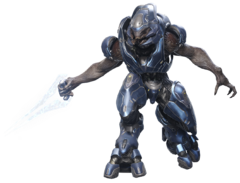 Various Sangheili phenotypes (not to scale) | |
| Biological overview | |
|
Latin name: |
Macto cognatus |
|
Classification: |
Saurian |
|
Diet: |
Omnivorous |
| Physical information | |
|
Avg. height: |
|
|
Avg. weight: |
139–178 kg (307–393 lb)[1] |
|
Distinctions: |
Humanoid reptilian body structure; quadruple-hinged mandibles; binary circulatory system |
| Sociocultural information | |
|
Homeworld: |
|
|
Tier 2 | |
|
Notable individuals: |
|
|
Also known as: |
|
|
Languages: |
|
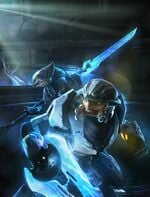
This article is part of a series on
Sangheili
- Technology
- History
- Culture, Politics & Economy
To check out information for other sapient species, see here!
- "On the blood of our fathers, on the blood of our sons, we swore to uphold the Covenant!"
- — Rtas 'Vadumee before the raid on the Threshold gas mine.[8]
The Sangheili[9] (Macto cognatus in Latin taxonomy,[10] meaning "I glorify my kin") are a saurian[11] sapient species known for their warrior culture and combat skill. Named after their home planet, Sanghelios, they have historically been known to humans as Elites for their former role in the Covenant's military hierarchy.[12] Originally one of the Covenant's two founding species, the Sangheili formed the hegemony's military backbone until just before the end of its existence. They had a very strong rivalry with the Jiralhanae,[13][14] which finally led to genocidal violence during the Great Schism at the conclusion of the Human-Covenant War.[15][16]
After the High Prophets Truth and Mercy ordered the genocide of the entire Sangheili race during the Great Schism,[17][18] the species was forced into civil war against the Covenant proper.[19] This was established after the assassination of the High Prophet of Regret at the hands of John-117. The two remaining Hierarchs held the Sangheili responsible for the Prophet of Regret's death, and the species was seen as "unfit" to continue to guard the Prophets. The Prophets sought to achieve this through the use of the other Covenant races, primarily the Jiralhanae. Consequently, the Sangheili led a rebellion against the Prophets. A significant number of Sangheili sided with the UNSC against the Prophet-led Covenant; this alliance continued to hold in the post-war era. The Great Schism formed the bedrock of the Covenant Empire's ultimate collapse and the end of the Human-Covenant War.
In the post-war years, the Swords of Sanghelios, led by Arbiter Thel 'Vadam and a grand council of kaidons, emerged as the effective Sangheili government.[20] However, they were opposed by multiple Sangheili factions with differing ideals of how to build a future for their civilization, and the species remained embroiled in civil war for several years while continuing hostilities with Jiralhanae groups, in a two-front war.[21]
History[edit]
The Ark and reseeding[edit]
The Sangheili evolved in tropical wetlands of their homeworld, Sanghelios.[22] Sanghelios had at one point been visited by or had been in contact with the Forerunners. During the Forerunner-Flood war, the Librarian visited the planet to retrieve specimens of the Sangheili for preservation aboard Installation 00. After the firing of the Halo Array, they were returned to their home planet to begin rebuilding their culture.[23]
Development of civilization[edit]
Much of the Sangheili's pre-Covenant history is being rediscovered by the Sangheili themselves.[24]
After being returned to their homeworld, the Sangheili discovered artifacts left by the Forerunners on their planet. The Sangheili revered the objects these "gods" had left, and considered tampering with them a heresy beyond any other. However, some Sangheili scientists defied their species' dogma and studied Forerunner artifacts in secret; they would later become instrumental in helping the Sangheili reverse-engineer weapons against the San'Shyuum.[25] Several hundred years prior to the formation of the Covenant, the Sangheili had developed slipspace technology and created dozens of independent colonies, though their homeworld of Sanghelios remained central to governance and culture. The planet of Creck, discovered before the Sangheili's contact with the San'Shyuum was the seventy-sixth of designated worlds explored by Sangheili. At some point, an unknown number of Sangheili clans waged war upon each other for numerous years on Sanghelios. These engagements became known as the Clan Battles of Sanghelios.[22]
Forming the Covenant[edit]
In 938 BCE the Sangheili encountered the Reformist San'Shyuum, a race who also worshiped the Forerunners as gods, but had utilized Forerunner technology for their own needs, believing the technology had been left behind by the gods as gifts for their children.[26] This sparked a war between the two races over how to treat the relics. Even though the Sangheili were much more physically imposing and numerous, they suffered extreme casualties under the sheer power of the San'Shyuum's Dreadnought, a surviving Keyship, and by 876 BCE even the most devout had to admit their survival depended on the reconstitution of their own Forerunner technology. This led both sides to an agreement that ended with the decommissioning of the Forerunner Dreadnought and a shaky alliance that eventually expanded into the Covenant.
The San'Shyuum helped assuage the Sangheili by informing them of the Great Journey: by seeking out the Holy Rings scattered throughout the galaxy and utilizing them, a "Great Journey" would transform believers into godlike beings. The Writ of Union was drawn up in 852 BCE in order to codify the Covenant. Its first canto clearly outlines the nature of the Covenant from the perspective of the Prophets.
Being one of the few races in the Covenant to achieve space-faring status without outside intervention, Sangheili interaction with the San'Shyuum was initially strained due to memories of the recent war. Many Sangheili felt that the Writ of Union meant surrender to the San'Shyuum, although most never voiced these concerns.[27] The Sangheili Ussa 'Xellus led a major rebellion against the Covenant that was eventually neutralized with the rebel Ussans going into hiding.[28] Over time, the San'Shyuum and Sangheili formed a prosperous relationship, eventually laying the foundation for the modern Covenant hegemony.
During their membership in the Covenant, the Sangheili were simply put, technological and societal equals of the San'Shyuum. However, for a significant period, they found themselves as the dominant military muscle for the entire Covenant structure - hardly surprising given the warlike, feudal nature of their homeworld. What was surprising was the cyclical stability this feudal society was able to offer. Technological and medical advancement prospered, and the intelligent, aggressive Sangheili were peerless until they encountered the San'Shyuum. With exchange of goods and ideas, the Sangheili adapted to and eventually embraced the Covenant religion, grafting its tenets to their own belief system.[10]
Human-Covenant War[edit]
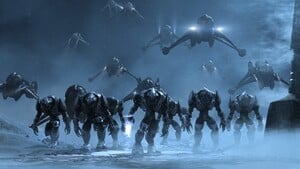
- Main article: Human-Covenant War
When the Prophets declared war on a previously unknown species called humans, the Sangheili followed their lead without question. After a period of time, however, even though the Prophets insisted that the humans were "unclean beings" that must be eliminated from the galaxy, some seasoned Sangheili veterans began to question the refusal of the Prophets to even consider accepting the humans into the Covenant. They seem to believe that humans, although physically weak, at least compared to themselves, are brave and even honorable. As such, these few Sangheili believed that humans should be offered admittance to the Covenant due their ability to put up a fight on the ground.[29] Some even believed that the humans were equal to them - a considerable step for a Sangheili, or any member of the Covenant, to make. These Sangheili admired how willing and brave the humans were when fighting to survive against outright extinction, they even respected to a certain degree those few soldiers who were willing to stay behind and cover their comrades from a Covenant attack. A few Sangheili even had more respect for the humans than they did for the San'Shyuum before the Great Schism.
The Great Schism[edit]
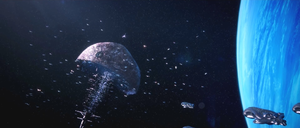
- Main article: Great Schism
During the final months of the Human-Covenant War, the political shift caused by the High Prophet of Truth and Tartarus, the Chieftain of the Jiralhanae, started a slippery slope that ended in the dissolution of the Covenant between the Sangheili and the San'Shyuum. Originally, the Jiralhanae were viewed as savagely aggressive and extremely goal-oriented, which the Sangheili viewed as a serious threat should the Brutes ever begin to desire political power. This fear became reality when the Honor Guards of the Prophets, originally an all-Sangheili class, were transformed into a duty of the Brutes. This was directly caused by the death of the High Prophet of Regret at the hands of John-117, the human "Demon", despite Regret's protection from his personal squad of Sangheili Honor Guardsmen. Soon the Jiralhanae found themselves in new positions of power, becoming veritable replacements for the Sangheili. During the concurrent Battle of Installation 05 and the Fall of High Charity, the Jiralhanae had begun to massacre the Sangheili under Truth's orders to exterminate the entire species.[17] Additionally, Arbiter Thel 'Vadam and Special Operations Commander Rtas 'Vadum discovered the truth of the Halo rings from the Monitor 343 Guilty Spark. From this, they learned that the Prophets' promises of the Great Journey were false causing further turmoil.
These events led the entire Sangheili species to secede from the Covenant, unified to bring down the empire that had betrayed them.[19] They were aided by a few of the member species within the Covenant, such as many Unggoy and most Mgalekgolo, although many sided with the High Prophets despite the Sangheili's efforts. The secession included a movement to destroy the treacherous Jiralhanae and High Prophets, and the destruction of the Flood at all costs, eventually resulting in an alliance between the Fleet of Retribution and humanity.
The Great Schism stretched from the human homeworld, Earth, all the way back to Sanghelios as the Sangheili attempted to wrest their share of the hegemony away from their new-found enemies. The Jiralhanae stepped in to fill the military void in ever increasing numbers, sensing the vacuum and opportunity left by the departure of the Sangheili.
Fall of the Covenant[edit]
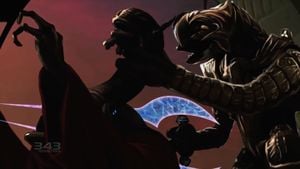
- "I am not Covenant. The Covenant is dead. It was a lie. I am Sangheili."
- — Jat to Dahlia on Carrow.[31]
After the Battle of Earth, the Sangheili and humans managed to stop and subsequently kill the High Prophet of Truth, effectively dissolving the Covenant. However, the Sangheili and humans were coerced to deal with a more massive threat; the Flood. Finally, the Arbiter and the Master Chief, after activating the newly constructed replacement Halo ring, effectively ended the Flood threat.
Following the destruction of the Covenant, Sangheili society plunged into crisis. Already lacking centralized governance and splintered to independent city-states spread across several dozen major colonies,[32] they fractured into multiple infighting factions with varying ideas on how to run their society, despite their ongoing war with the Jiralhanae. This was largely due to the fact they had become reliant of the Prophets during the millennia of the Covenant's existence. As they regained their independence, they were forced to re-learn to manage their society on their own, without the direction of the Prophets or the manual labor provided by the other client races.[33]
During this time, Arbiter Thel 'Vadam managed to gather a sizable alliance of keeps under the banner of the Swords of Sanghelios, which became the preeminent governmental entity among the Sangheili.[20] Many other factions, such as the Servants of the Abiding Truth, opposed Thel 'Vadam and his allies, specifically their rejection of the notion of the Forerunners being gods.[34] This eventually led to the Sangheili civil wars known as the Blooding Years.
As the Great Schism went on, the Sangheili continued their fight against the Jiralhanae. This was proving largely unsuccessful and the Sangheili were accepting serious losses. Without the Covenant to provide them with ships, technology, and repairs, they slowly lost warships and technologies they could not repair or replace. After the San'Shyuum went into hiding, the Sangheili began to prevail against the Jiralhanae, who in turn began to fight among themselves. Having abandoned the Covenant, the Sangheili were now in a state of mass confusion in regards to their religion, because even though the San'Shyuum lied to them, they had still given them purpose for their actions. Many Sangheili were still religiously devoted to the Forerunners and were attempting to uncover the meaning of their faith.[35]
Many Sangheili continued to relentlessly hunt down and slaughter the Jiralhanae.[36][37] While the two species typically did not work together due to their feud,[38] a few were persuaded by Atriox to work for the Banished, as he claimed to have no complicity with Tartarus and the other Jiralhanae who had betrayed and massacred their kind.[39] As such, a small minority of Sangheili joined the Banished as mercenaries, some of which used their earnings of military resources to fight out disputes with other Sangheili kin on their homeworlds.[40] Joining the Banished was frowned upon in Sangheili culture, Let 'Volir's name was notably forever tarnished for working under a Jiralhanae.[41]
Human involvement[edit]
After the Human-Covenant War, there was competition between the UNSC and the Sangheili, when it came to examining Forerunner ruins and relics like the Portal at Voi.[42] By March 2553, a tentative ceasefire continued to exist between humanity and the Sangheili. Although Arbiter Thel 'Vadam campaigned for peace between the two species across various Sangheili states, many Sangheili continued to view humans with suspicion, perceiving them as a threat and wanting to destroy them once and for all. At the same time, the UNSC's Office of Naval Intelligence took advantage of the unstable political situation, attempting to keep the Sangheili splintered and disorganized by inciting the Servants of the Abiding Truth, led by Avu Med 'Telcam, to rebel against 'Vadam. This was to ensure the Sangheili would not pose a threat to humanity again, in spite of the UNSC's alliance with the Arbiter's faction.[43]
ONI's aid allowed the Servants of the Abiding Truth to amass enough weapons to begin an all-out insurrection against 'Vadam and his allies in early 2553. Meanwhile, however, ONI's efforts also backfired; partially as a result of their actions the Sangheili Jul 'Mdama began a personal quest against humanity, forming a Sangheili-led reconstituted Covenant mainly from ex-Covenant forces. Four years after the battle at the Ark, this group launched an invasion on the Forerunner shield world Requiem, intending to find and awaken the Didact, a Forerunner Promethean they revered as a living god.
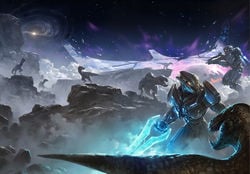
In spite of ONI's underhanded mission, relations between humanity and Sangheili at large continued to be amicable. For example, the UNSC and the Sangheili under the Arbiter maintained mixed control over certain space territories, known as Joint Occupation Zones. The UNSC and Swords of Sanghelios participated in joint operations, including the Mission to Installation 00, where they successfully prevented the reactivation of the Halo Array and an attack on Earth. The UNSC Navy and the Sangheili also participated in joint naval operations, including one against pirates in 2557.[44] Human and Sangheili scholars also gathered and studied the Covenant's records together on Sanghelios.[45] Collaborative weapons research (such as the study of the physics behind the Type-33 Needler) and exchanges in military intelligence between the two species is also known to have taken place.[46] and Zeta Halo containment efforts. In addition, a select number of Sangheili are known to have been offered the opportunity to train alongside Spartan-IVs in War Games simulations as part of the ANVIL initiative.[47] A notable example of trust and technological exchange between humanity and Sangheili is the Helioskrill armor, a variant of MJOLNIR Powered Assault Armor, one of the most sophisticated pieces of human technology, which was designed by a Sangheili prodigy and manufactured by the Kolaar Manufactorum, a forge based on Sanghelios.[48] Not all humans were amicable towards coexistence with the Sangheili, as seen with the Sapien Sunrise. In one notable incident, nine members from the aforementioned terrorist organization infiltrated Richard Sekibo's delegation at a peace summit on the colony world of Biko. They intended to assassinate Sekibo and a Sangheili delegation while framing the Sangheili of the crime. The assassination attempt was foiled by Spartan John-117 though Sekibo was mortally wounded. Unfortunately, the truth was covered up and John-117 was used as a scapegoat to hide the UEG's laxity towards preventing the attack, much to the frustration of the Sangheili delegation. Later John-117's name was cleared.
During the crisis that followed the dissolution of the Covenant, some Sangheili sought asylum on Earth. In 2558, at least one settlement of former-Covenant races was based in the South American city of Rio de Janeiro Between 2557 and 2558, at least one Sangheili terrorist infiltrated the settlement and attempted to detonate a HAVOK tactical nuclear weapon in the city, but was captured by UNSC forces.[49]
In one notable incident, the Office of Naval Intelligence deployed three prowlers to trail the allied Sangheili assault carrier Shadow of Intent. All three stealth vessels were reported destroyed under unclear circumstances; the losses were not reported to UNSC Naval authorities.[44] Despite this, the alliance between the Arbiter and humanity continued to hold. On March 5, 2558, 'Vadam accepted the UNSC as mediators to oversee his peace negotiations with the Jiralhanae Chieftain Lydus. However, the negotiations were put on hold due to an attack by New Colonial Alliance mercenaries.[50]
On October 28, 2558, the Swords of Sanghelios emerged victorious over Jul 'Mdama's Covenant at the Battle of Sunaion.[51] However, following this victory, Sanghelios fell under Created rule, remaining this way until at least November 2559. Three days after the Razing of Oth Sonin, Arbiter Thel 'Vadam held a High Gathering with several high kaidons where he proposed the Concert of Worlds, an alliance to further unify the Sangheili. However, given the reluctance at the gathering, he suspected that many of the high kaidons appreciated Cortana's enforcement of "peace" and for protecting them from the Jiralhanae threat.[52]
Description[edit]
Sangheili are physically imposing beings, typically standing more than a foot (30 cm) taller than the average human. They are vaguely reptilian in overall appearance, with leathery skin, digitigrade legs, and sharp claws and teeth. Their large hands have two fingers and two thumbs. Their most distinguishing trait is their jaw structure, which is made up of four separate mandibles attached to their face.
Sangheili are intelligent, agile, and extremely strong, and are often characterized by their bravery and honor. Sangheili warriors augment these natural abilities further through use of energy shields integrated into their armor. Depending upon rank and mission objective, they are commonly seen in battle with plasma rifles, carbines, needlers, needle rifles, along with their cultural signature weapons, energy swords. Sangheili employ coffin-like orbital insertion pods as well as Spirit and Phantom dropships for military transit purposes and rapid-response operations.
Historically, Sangheili have followed the Covenant mentality of maintaining hatred towards humanity, believing them to be an affront to their religion and a challenge towards the Great Journey. However, many Sangheili were able to put this animosity aside when an alliance of Sangheili joined the UNSC during their expedition to the Ark. After the Human-Covenant War, many Sangheili are still distrustful of humanity and some participate in terrorist attacks against them. Nonetheless a large number of Sangheili, most notably those loyal to Thel 'Vadam, have attempted to form steady alliances with their former enemies, as well as improving relations with other former Covenant species such as the Unggoy and Jiralhanae.
Anatomy and physiology[edit]
Sangheili are muscular and very tall, usually standing between 2.25 and 2.62 meters (7.38 and 8.6 feet), although they often seem slightly shorter due to their usual hunched position, but the armor they wear makes them appear more hunched than they actually are.[1][2] Their jaws are quadruple-hinged, with an upper jaw and four lower mandibles arranged in two tiers. Mandible and upper jaw structure along with teeth shape and numbers result from different phenotypes, but they do not indicate reproductive isolation.[53] These mandibles have between six and twelve teeth each, and some Sangheili have an additional, larger fang on the tips of each mandible.[54][55] Anywhere from eight to more than a dozen broader teeth may be mounted on the upper jaw structure. Adult Sangheili mandibles can be found in varying shapes, sizes, and ranges of dexterity, and are as distinctive as a human fingerprint.[56] Some Sangheili also possess molars. Sangheili smell with the use of two nostrils, each slightly in front of and below the eye socket. Given their predatory nature, a Sangheili's sense of smell is likely very developed. Despite the Sangheili jaw structure, they are able to pronounce the letter "M" without difficulty, a fact that human scientists have been unable to explain.[57] They do, however, have difficulty pronouncing "P". For example: Dr. Evan Phillips, one of the foremost human Sangheili experts, was addressed as and referred to as "Phillisss". Additionally, the Sangheili skull has a density sufficient enough to prevent a .40 caliber bullet from being able to exit the other side upon impact.[57]
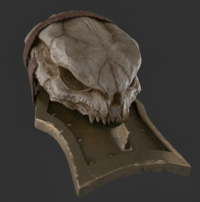
Their hands are tetradactyl, each having two fingers in the middle and an opposing thumb on either side. Contrary to what their anatomy might suggest, Sangheili could release a loud, sharp and piercing whistle by placing their thumbs on the same hand into their mouths and blowing through the narrow gap.[58] Their legs are digitigrade, with short upper and lower legs, and elongated tarsals, using the distal and intermediate phalanges to support their weight when walking. This arrangement possibly allows them to run very quickly and jump large distances, compared to ordinary humans and other Covenant races.[59] Their superior agility may also be attributed to their homeworld's higher gravity; the additional strength required to move normally in a high-gravity environment would likely cause them to be more powerful in lower gravity situations. (Although, curiously, their tall, large, and lean figure would be extremely disadvantageous and impractical on a high-gravity planet—an arrangement possibly allowed by other major factors in their biology and life cycles; alternatively, the impressive strength and agility may be the result of the capabilities of their standard-issue combat harnesses.) They also appear to have a double set of pectoral muscles, which contributes to their incredible strength. On the other hand, their digitigrade stance makes it difficult for them to climb vertical constructs such as ladders.[60]
Sangheili have a binary circulatory system[61][62] that pumps indigo-colored blood. They breathe oxygen and their homeworld has a nitrogen-oxygen atmosphere comparable to Earth's, allowing them to breathe the same atmosphere as humans. Sangheili cannot breathe molecular nitrogen.[63] Sangheili have a similar digestive system to that of humans. They are shown to have an esophagus and intestines,[64] and are also depicted to have an anus.[65][Note 1]
Most Sangheili have leathery skin covered in many part by scales. Young Sangheili have pale protective scales hanging from their necks that they lose with age, an evolutionary leftover from the days when Sangheili parents used to carry their offspring in their jaws.[66] Sangheili skin color can range from light brown to dark brown, light gray to black, and blue. They have forward-facing eyes with vertical slits and horizontal eyelids much like those of terrestrial reptiles,[67][Note 2] likely giving them high-resolution central vision and depth perception. Their eyes can have multiple colors ranging from red all the way to green and can be even gray. Most Sangheili, however, have yellow or orange eyes.[Note 3][Note 4]
Sangheili exhibit minor sexual dimorphism, with the females being slightly smaller than the males.[68] Sangheili males possess a subtle leathery scent, while females have been described as smelling like "clean feathers".[69] Sangheili are oviparous, meaning that they lay eggs rather than giving live birth.[70] They incubate their recently hatched young in tank-like pods.[71] The species is remarkably long-lived; Sangheili over 60 or 70 years of age have shown to be fully fit for combat duty,[72][73] and Jul 'Mdama was considered young, at least in keep elder terms,[74] at 64 years old,[75] Thel Vadam was considered to be one of youngest Sangheili to not only be promoted to Shipmaster but also one of the youngest Sangheili to achive the title of Supreme Commander between his late 40s to early 50s[76] while by 851 BCE, 'Crecka was over 90 years old.[22] Nizat 'Kvarosee was stated to have served in the Covenant for roughly 200 human years.[77][78] Circa 100,000 BCE Sangheili life expectancy was 27 Earth years.[70][79] This discrepancy was likely due to their primitive culture at that time having little, if any, function medicine, whereas Sangheili of the 26th century have medicine and medical technology surpassing humanity.
Culture[edit]
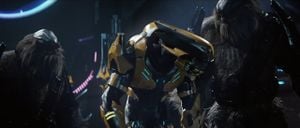
Although Sangheili are naturally very intelligent, their culture's long dependence on a military-industrial schema has led to an emphasis on might over science. In some regards, the advent of the Covenant made this position easier, allowing the Sangheili to concentrate even more monomanically on military endeavors, while Prophets took care of science and technology.[10] Despite this, their adeptness at using and creating technology is evident. In addition, despite their warrior culture being the most well-known, it has been noted that the Sangheili actually have almost innumerable roles within their society, from political entities like kaidons and keep elders all the way to the more technical artisan-engineers and farmers.[80]
Raised from childhood to be warriors, other societal roles are treated as secondary endeavors or even hobbies. Doctors are considered outright dishonorable as they "spill blood" outside the battlefield;[81] despite this, the Sangheili are known to employ advanced medical technology[10] that is superior to humanity's.[82] Few doctors exist within Sangheili society. Instead, Huragok and other species are employed as medical personnel. Most injuries sustained by the Sangheili can easily be treated by the medical technology employed by the species, otherwise they accept their fate. However, Sangheili hold disdain for using medical technology to treat themselves and some personally would rather suffer through their injury or die. There is evidence of this being overturned, however.[83] Some Sangheili recognize that other species do not share the same views on medical treatment and were willing to lend them their medical technologies or even treat the wounded individual themselves.[84] Sangheili are trained to be skilled in most ranged weapons, as well as hand-to-hand combat. A prominent example of this martial focus is that only aristocrats are allowed to wield energy swords and that sword-wielders are then no longer eligible for marriage; however, they may breed with any female they choose, married or otherwise, to ensure successful transmission of "swordsman" genes. Many Sangheili children are trained in basic swordsmanship early on, both for personal development and for them to be capable of using a sword later in life if necessary. Within the military, an aristocratic title is not necessary for wielding an energy sword.[85]
Military promotion among the Sangheili is by merit. A Sangheili soldier must succeed to advance among the ranks, with this success being measured in combat kills. A Sangheili near the top of the military hierarchy may have personally slaughtered thousands of individuals to reach that status.[86]
Historically the Sangheili have considered most other species to be inferior to them, both culturally and in fighting skill; this thinking has caused Sangheili to treat other species cruelly and in an arrogant manner. This eventually led to the feud between the Sangheili and Jiralhanae, as the latter's strength threatened the Sangheili's superior military status. In the years following the Great Schism the Sangheili entered a period of cultural renaissance however, triggering a rethinking towards their practices under the Covenant. This included views on medicine,[83] secularism (seen in the war between the theocratic Covenant and secular Swords of Sanghelios), gender roles,[87] and technology, and there was also evidence to suggest that views on other species underwent a gradual ongoing alteration too. It was noted that an Unggoy was able to take command of Sangheili and lead them in such a way so as to inspire respect and admiration from them.[88] This was unprecedented given the past observed relationship between the two species. The longstanding feud between the Sangheili and Jiralhanae was well documented, but in 2558 Thel 'Vadam engaged in peace talks with a Jiralhanae Chieftain known as Lydus on Ealen IV. Lydus accused Thel of engaging with the talks so that the Sangheili could simply acquire Jiralhanae resources, however Thel rebutted the notion with the idea that the Sangheili cared for more than just that.[21]
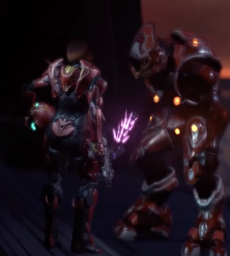
One great indicator of the Sangheili's evolving attitudes towards other species was their interactions with humans in the decade following the end of the Human-Covenant War. During and immediately after the conflict, many Sangheili espoused the Covenant's position towards humans as being heretics, and humans were subject to much of the same cultural arrogance from the Sangheili that the other species received; perhaps worse. Even by 2552, however, a growing number of human sympathizers existed among the Sangheili youth,[89] and by 2558, the social landscape within the Swords of Sanghelios appeared drastically different with regards to humans. Specific examples include the development of a GEN-2 Mjolnir variant known as Helioskrill armor by a Sangheili weaponsmith,[90] training programs involving Spartan-IVs and Swords of Sanghelios troops in the ANVIL Initiative,[91] joint-operations between UNSC and Swords of Sanghelios in the joint-occupation zone against pirate raiders, cooperative weapons and technology research and development (Such as with regards to the Needler[46] and the ANUBIS-class Mjolnir variant's enhanced sensors[90]) as well as other cooperative endeavors between the two powers (Archivist teams[46] and Zeta Halo containment efforts[92]). The obvious practical nature of much of these endeavors strongly implies that the Sangheili have come to view humans as a worthy investment, investor and ally, which is in stark contrast to their culture of 10 years past. Even in more remote locations on Sangheili colonies the culture appeared to be undergoing remarkable change. It was noted by Olympia Vale during her travel to Khael'mothka that she met many Sangheili who had become tired of the war and who were intrigued by the idea of a human staying with them. There were of course those who would try to harm Vale if they could, however she learned who to stay away from and for the most part found herself in no personal jeopardy.[93]
There were many who refused to change their ways, such as Jul 'Mdama's Covenant, this was highlighted by the Sangheili civil war. Progressive factions in Sangheili society appeared to have won following the emergence of the Created, as Jul 'Mdama's Covenant was entirely wiped out by Swords of Sanghelios forces.[94]
The small minority of Sangheili who joined the Banished have had their names forever tarnished in Sangheili culture.[41] Sangheili working for the Jiralhanae was deeply frowned upon,[38] especially after the massacres of the Great Schism.
Sense of honor[edit]
- "But you "warriors" have always been guided by...blinded by...the illusion of honor."
- — Atriox on Sangheili[95]
The Sangheili display respect and admiration for honorable fighters, whether they are allies of the Sangheili or not; it is not unusual for the Sangheili to have such an admiration for their adversaries. Sangheili respect and revere veterans and often follow their lead. Their history is rife with victorious combatants welcoming the defeated enemies' remaining forces into their own army, provided of course that they fought with honor. During the Unggoy Rebellion, the most tenacious of the Unggoy who survived the conflict were admitted for the first time into previously all-Sangheili forces, much to the Prophets' discontent.[96]
Despite their intelligence, the Sangheili often allow their obsession with honor to cloud their better judgement. The Sangheili usually employ complex strategy only if it either improves success in battle, allows them to inflict more casualties on their enemies, or if it conforms to their code of honor. Otherwise, in both tactical and strategic combat, Sangheili generally charge their enemies with reckless aggression, regardless of any damage they sustain. Only very seldom do they admit temporary defeat. While lower-ranked Sangheili might make numerous tactical mistakes, especially the Minors, such as standing in the open rather than taking cover, more experienced Sangheili tend to lure their enemies into traps and quickly dispatch them in close combat. Sangheili often sustain heavy casualties in the fervor to kill, though they use their client races to screen and protect themselves. The race's desire for grandeur has led to their defeat in many engagements, such as the Battle of Psi Serpentis, Operation: FIRST STRIKE, and the Onyx Conflict.
One of the clearest examples of how zealous the Sangheili are for honor comes from when Thel 'Vadamee engaged the UNSC during his time as Supreme Commander, when Thel and two Special Operations Sangheili attacked an unarmed 3rd Battalion Reserves during the assault on Camber. When Thel saw the humans unable to defend themselves, he dropped his Okarda'phaa-pattern plasma rifle and activated his active camouflage so the Marines could gear up and have a chance to fight. This was the first time the humans documented the Sangheili strive for honor, even if it endangered themselves or others.
Conversely, those who favor practicality over religious fervor in combat exhibit keen tactical and strategic acumen. The Zealots, despite being among the most fervent adherents of the Covenant's religion, use shrewd, pragmatic tactics and are willing to engage in subterfuge in lieu of open combat. Similarly, special operators and stealth specialists use active camouflage even in combat, though most would prefer to fight outright than to skulk in shadow. The separatist Fleet of Retribution destroyed the Prophet of Truth's fleet, despite the latter outnumbering the former three-to-one. Some Sangheili, such as Jul 'Mdama, see honor as more of an aspiration than a way of life and are willing to engage in deception if need be, particularly after seeing humans use such tactics to great effect.[97]
The Sangheili honor code is similar to a few throughout human history,[98] sharing concepts such as skill in combat (with an emphasis on swordsmanship), loyalty to master and family/clan, and views on death. Some such systems promote death in battle as being the most honorable and proper way to die. If a warrior is critically injured, incapacitated, or captured, the only acceptable recourse is to commit ritualistic suicide, ensuring one's honor is kept intact. This is of such importance to Sangheili warriors that even if they are incapable of killing themselves, they may request the assistance of their fellow Sangheili in doing so.[99] The Sangheili consider being captured in combat to be dishonorable. To retain his honor, a valiant Sangheili would typically commit suicide while in prison. Often when imprisoned Sangheili are freed those who have not killed themselves are executed anyway, as was the case with one of Thel 'Vadam's ancestors. However, escaping or staging an uprising is acceptable, by the same example.[100]
Customs and superstitions[edit]
Despite their martial nature, the Sangheili have reservations to the spilling of one's own blood. This is an extension of the belief that the blood of a warrior is his essence, which is synonymous with his honor; thus, to spill one's blood is to lose one's honor.[81] As a result, in Sangheili culture, doctors are seen by many as the lowest members of society because they "make [their] living slicing and causing another Sangheili to bleed without honor."[81] This means that the only 'honorable' way for a Sangheili to be injured or bleed out is from combat with the enemy. This belief also makes visiting a doctor very shameful for some Sangheili.
The Sangheili seldom view personal weapons as anything more than tools of war, and rarely attach extra importance to a weapon simply because it once belonged to a great warrior. This was especially true during the Covenant's days, when weapons were mass-produced and warriors did not carry customized weapons. However, certain historical weapons, such as the End of Night, were so famous that they were said to possess a small part of the owner's heart, and were given names as a result.[101]
Many Sangheili believe that a weapon is to be drawn only if it is to be used, because a drawn weapon "demands blood."[102] However, it appears that the user's intention when it is being drawn matters more than the weapon actually being used. For example, a Sangheili may draw his weapon when he is not sure if an incoming dropship contains friends or foes, only to deactivate it upon seeing friends exit the dropship.[103]
As a symbolic gesture of love for his people, a Sangheili leader may choose to walk among his followers and help them in their duties, even doing what is normally considered females' work such as helping them care for eggs. This is also done to inspire the Sangheili to work diligently so as to not be outdone by their superiors.[104]
In warfare, the Sangheili traditionally upheld a martial tradition known as Shrwssha'wash; a ritual dismemberment of defeated foes. The tradition is most commonly manifested by the displaying of the enemy's skull as a trophy.[105]
Government[edit]
The Sangheili often had no unified government; typically they are splintered into numerous feudal,[106] meritocratic states.[107] A given state is governed by a single clan residence and assembly house known as a keep, headed by a kaidon selected by a council of elders. There are usually a number of "client keeps" belonging to different clans under the leading keep's rule,[108] though a state's elders will assume the kaidon's clan name as a title signifying their position, regardless of the name of their own family keep.[109] Sanghelios was once governed by the Council of City States during the early history of the Covenant.[22] After the fall of the Covenant, the newly restored Swords of Sanghelios were able to unite the keeps of Sanghelios as a planetary government, along with controlling many other Sangheili colonies, after emerging victorious in the Sanghelios global civil-war.
In Sangheili culture, it is customary to settle disagreements with authority by assassination, though one has to use personal weapons in order for the practice to be considered honorable.[110] For example, if a council elder believes that his vote was ill-advised or had second thoughts, it is considered a tradition for council elders to initiate some form of attack, such as sending assassins, against the kaidon in order "...to test the true merit of [the] ruler's martial abilities."[107] The belief was that "a kaidon who could not defend himself was not a true leader."[81] Should the attack fail, the responsible elder will be executed immediately, and his family will be killed. However, punishment for this form of failure was usually flexible. As such, if the elder did something honorable, such as attack the kaidon himself, or attempted to make a final stand against the kaidon, then he would probably have managed to save his family from certain death, although they might still be banished.
Family[edit]
Family history and lineage are greatly valued, with each family having their own unique "battle poem" and "saga wall" detailing the deeds and actions of its members during times of war.
Although Sangheili society is classified as being patriarchal,[10] and while most males serve as warriors, female Sangheili hold considerable power in issues within their family keeps, including political matters, civil duties and trade, while Sangheili males are sent into service as warriors. The status quo of gender roles in Sangheili society has lately been challenged however by the Swords of Sanghelios, as Olympia Vale noted after meeting Mahkee 'Chava, a female shipmistress.[87] Sangheili females have access to records of their own bloodlines, and are able to choose their mates.[111] The maintaining of a clan's familial records is typically the duty of the wife of the keep elder.[112] The concept of divorce is completely foreign to Sangheili.[113]
Sangheili warriors form very close-knitted relationships, referring to their comrades as "brothers" or "sisters" and remaining intensely loyal to them. This loyalty is shown in the custom of grieving after the death of a fallen comrade, a ritual which includes prayer for the dead warrior.
Children[edit]
Newly hatched Sangheili are called "childlings", and as they grow older, they are then referred to as "younglings".[114] During the first decade of their lives, Sangheili children have protective scales that hang from their necks, an evolutionary holdover from the days when the Sangheili used to carry their offspring with their toothy mandibles away from danger.[66] Sangheili children are typically raised in the communal environment of their family keep to ensure that all start on an equal footing and progress in rank by merit of their abilities. They are not allowed to know the identity of their true fathers and are usually raised by a maternal uncle instead. This is a method of preventing status from being inherited in order to force children to make their own way in the world so they actively work for and earn advancement,[115] thus minimizing nepotism and promoting loyalty to the whole clan rather than their parents.[116] However, as some children's fathers are swordsmen who have been granted the right to reproduce with any number of female Sangheili they desire, the use of a maternal uncle as a father-like figure is used to allow children to be raised equally.[10] Sometimes the individual acting as a Sangheili's "uncle" is in fact the father, but this makes no difference to his role as the child will never know.[117] To help enforce this custom, young Sangheili females may use a device known as a trysting pod to summon their mates on covert dates, as to keep the secrecy of the father in place.[118]
While traditional on Sanghelios, the custom of Sangheili children not knowing their fathers is not followed on all Sangheili-occupied worlds, particularly ones with smaller populations and tighter-knit families such as Rahnelo.[116] Ussan Sangheili, who diverged from the mainline Sangheili culture at the dawn of the Covenant, are allowed to know their fathers, presumably because they wanted to be sure who was descended from legendary figures such as Ussa 'Xellus and Ernicka the Scar-Maker and to possibly avoid inbreeding given their limited numbers.
Both male and female Sangheili are taught to fight from a young age. Though only males go on to become warriors, it is believed that the females should be able to defend themselves in the event their keep is attacked.[119] A popular pastime for Sangheili children is to hunt small rat-like creatures that live on their homeworld.[120] Young Sangheili also learned and sang old narrative poems, the most famous and widely known being the legendary ballad of the demigod hero Kel 'Darsam.[121]
Language[edit]
- Main article: Sangheili (language)
The Sangheili language, which served as a lingua franca to the Covenant, is rather harsh and guttural to untrained ears. While much remains unknown about its overall structure and conventions, it is known that certain sounds are largely absent from the Sangheili language due to their unique mouth structure; for example, Sangheili have difficulty pronouncing human words containing the letter "v" or ending with "p", resulting in the name "Evan Phillips" (As in Dr. Evan Phillips, a scholar of the Sangheili language) being pronounced as "Efanphilliss" (however, there are names in the Sangheili language that use these letters, such as "Vadam" and "Ripa").
Certain Sangheili colloquial terms have been translated by human linguists; the majority of these are derogatory in nature. The word "Jir'a'ul" is a term of abuse for Jiralhanae, being a portmanteau of the name "Jiralhanae" and the word "a'ul," the Sangheili word for a lump of wool.[122] The Sangheili often refer to humans using the word "nishum," which translates roughly to "worm" or "intestinal parasite." The origin of this term lies with the first encounters between Sangheili soldiers and human military personnel. Upon first sighting human infantry, the Sangheili mistook their body armor for an exoskeletal shell. After examining dead human soldiers, the Sangheili discovered the relatively weak, fleshy creatures underneath the "shells" and came to the conclusion that they were some sort of internal parasite. Even long after this misconception faded, the term remained in use among the Sangheili as an unflattering insult to their human enemies.[123]
Naming conventions[edit]
The Sangheili place great value in names and titles, and consider names to be a privilege given only to those who are worthy. The Sangheili generally regard humans as nameless, aside from generic labels, such as the "Demon" moniker for Spartans. They resent that the humans have assigned the label "Elite" to them, along with many other, far more derogatory names, such as Squid-head, Hinge-head, and Split Lip.
A Sangheili's first name is a given name that is attained at birth and persists throughout their life. After reaching adulthood, they are given a badge name. During the time of the Covenant, this was often composed of two core parts: an adjective describing the individual, and a family name. Ado 'Mortumee was one practitioner of this system, where 'Mor' was his personal descriptor, and 'Tum' identified his lineage.[124] Alternatively, some may have their badge name drawn from their State of origin, which could be tied to a specific Keep or family. For example: Thel 'Vadam, (formerly 'Vadamee when he served the Covenant,) was from the Vadam lineage. Some lineages, such as Vadam, have control over their own states,[106] although this is not always the case; it is typical for Sangheili of other lineages to occupy smaller keeps in a state named after another lineage. Client keep elders within a given state typically adopt the name of the state instead of using their own family name.[71][108] An "ee" suffix denoting military service was adopted by personnel that served in the Covenant military. This latter portion was abandoned by most Sangheili rebels during the Great Schism, as they believed that the martial focus of their culture made distinguishing military service unnecessary. Typically, most elites followed either of the previous systems, although they were exceptions. Lengthened names, such as the prefix "Ika" (which meant that the Sangheili had been an aide to a Prophet of some sort), gave them higher status among other elites.[124] Additional titles, such as "Jar" and "Nar," appear to be related to specific ranks (Imperial Admiral and Fleet Master, respectively). Apart from the "-ee" suffix, the suffix "-ai" denotes swordsmanship, as with Bero 'Kusovai and Toha 'Sumai.[125] The suffix "-dai" specifically denotes a swordmaster in the short-path method of combat.[126] Some Sangheili have names tied to heroes, battles, and legends that harken back to early Sangheili history. These more ancient family names often retain the idiosyncrasies of a more antiquated Sangheili dialect.[127] Human linguistic xenoanthropologists still have only the most rudimentary knowledge of Sangheili naming conventions, in part because the Sangheili are themselves still in the process of rediscovering much of their own pre-Covenant history.[24]
The apostrophe in front of the clan name indicates a sound resembling a glottal stop or click.[128]
Homeworld and colonies[edit]
- Main articles: Sanghelios, Sangheili colonies
Sanghelios is the homeworld of the Sangheili species with a population of under 4 billion as of 2558.[129] Sanghelios is the fourth planet in a triple star system of stars Urs, Fied, and Joori. The planet has two moons called Qikost and Suban.[10]
As a space-faring species, the Sangheili have colonized multiple planetary entities as they ventured space, first expanding the reach of their own civilization and later that of the Covenant empire. There are several dozen worlds considered as major centers of their civilization. Like their homeworld, the colonies house a number of independent city-states as opposed to a unified government.[32] Joyous Exultation was a significant nexus of Sangheili military during the Covenant hegemony's reign, while Hesduros is an example of a more remote Sangheili colony.
Technology[edit]
Even before contact with the San'Shyuum the Sangheili had developed several types of starships like the Hekar Taa-pattern blockade runner and Lursu-pattern brigantine.
After ties deepened with Arbiter Thel 'Vadam and his Swords of Sanghelios following the Human-Covenant War, his Sangheili artisans began to reap the benefits of cheap and simple human automation aides, revelations of Forerunner language and command codes that had been locked away by the San'Shyuum, and entirely new modalities of thought and systems of investigation. Using Forerunner knowledge reclaimed by humans a Renaissance has begun among Sangheili artisans eager to explore new avenues of knowledge, demolishing opaque rules and taboos that shackled their craft under the Covenant. Even as the Created move to control both species and safely circumscribe their destructive tendencies it seemed inevitable that the combination of iconoclastic Sangheili artisans and insatiably curious human engineers would lead to wonders and terrors yet undreamed of.[130]
 This section needs expansion. You can help Halopedia by expanding it.
This section needs expansion. You can help Halopedia by expanding it.
Command structure[edit]
Cultural and political[edit]
- High Councilor
- The High Councilor was one of the highest positions attainable by a Sangheili in the old Covenant hierarchy. As members of the High Council, they shared governance with the San'Shyuum High Councilors and answered directly to the Hierarchs.[131]
- Arbiter
- The title of Arbiter was originally granted to the warrior ruler of the Sangheili clans,[132] and was considered a great privilege.[133] However the conflict caused by Fal 'Chavamee in his refusal of the Covenant religion, had led the Prophets to significantly repurpose the role. In times of an extraordinary crisis, it would be reserved for the most disgraced Sangheili and offered as a means to regain their honor through suicidal missions of great importance to the Covenant.[134] It also served as a convenient means for the San'Shyuum to silence Sangheili in positions of power who may have started to question the Covenant religion or the Prophets' rule.[132] Following the fall of the Covenant, the Arbiter's role as leader of Sanghelios has been restored by Thel 'Vadam, the incumbent Arbiter who killed the Prophet of Truth at the end of the Great Schism.
- Honor Guardsman
- As part of the Covenant Honor Guard of the old Covenant empire, the Honor Guardsmen were highly skilled warriors, hand-picked for the duty of protecting members of the High Council and the Hierarchs.[135][136] Although it was a great honor and they were expected to eliminate anyone who drew a weapon in the presence of a Hierarch,[137] the position was seen by some Sangheili as merely a ceremonial duty too removed from battle. One of the most formidable groups in the Honor Guard is the Light of Sanghelios.[138]
Military[edit]
Ranks within the Covenant Empire[edit]
In Sangheili culture, it is customary to promote individuals based upon their skills, abilities, and the number of casualties they inflict upon their enemy.[12] In the original Covenant, a fresh Sangheili recruit would start as a Minor (indicated by their blue-colored armor). When a Sangheili had acquired sufficient experience in the field, he would often be promoted as a Major (indicated by their red/crimson-colored armor), leading fellow Sangheili and lower-ranked species alike as field officers. Should a Sangheili choose to focus primarily on combat rather than leadership, he may eventually attain the rank of Ultra, a class composed of the most skilled Sangheili infantry.[139]
A further advancement in the ranks is the rank of a General. They have been observed personally leading both warships and infantry on the battlefield.[140] Whilst they can lead anywhere between hundreds to thousands of soldiers alone, when multiple Generals are required, they will fight in concert to resolve battles.[141][142]
One of the highest ranks attainable by a Sangheili, an Imperial Admiral bestows the control of large combined fleets and operate on powerful capital warships, such as an assault carrier or supercarrier. Rather than require groundside combat proficiency, they are requested to be tactically excellent and to hold a great influence over the vastly numerous troops within their command. The only known Imperial Admiral is Xytan 'Jar Wattinree.[143]
Titles[edit]
These military titles are retained for individuals who have garnered enough field experience and are not based on their military ranks.
The following are known titles:
- Weapons Master: Sangheili engineers who maintain and improve equipment used by the Covenant.
- Artillery Master: Sangheili who oversee artillery pieces.
- Field Master: Sangheili who lead land-based armies.
- Shipmaster: Reserved for Sangheili commander of individual ships, though they sometimes command small task forces, as well. The term "Shipmaster" is not exclusive to Sangheili, and is universally used by the Covenant to refer to an individual of any species in command of a starship.
- Fleet Master: Given to a high-ranking Sangheili in command of a fleet.
- Supreme Commander: The Covenant's equivalent of the human "Commander-in-Chief". The most well known Supreme Commander was Thel 'Vadam, who commanded three fleets during the Fall of Reach, while serving as fleetmaster of his own Fleet of Particular Justice, which he took to Installation 04.
- Imperial Admiral: The commander of the Covenant Fleet.
Groups[edit]
Zealots[edit]
Managed under the Ministry of Fervent Intercession, the Zealots are a specialized group of Sangheili tasked with the search and recovery of Forerunner artifacts.[144] They are involved in deep-infiltration, high-risk operations, sometimes led by a Field Marshal. In addition to artifact retrieval, the Zealots can also serve in other command roles.
In the new Covenant order led by Jul 'Mdama, most of the Zealots originate from Hesduros.
Special Warfare Group[edit]
- Main article: Covenant's Special Warfare Group
The Special Warfare Group is a military organization responsible for overseeing all special operations for the purposes of achieving the objectives for the previous Covenant body.
Fleet Security[edit]
A part of Covenant's Fleet Security, the Rangers are a group of Sangheili specializing in zero-gravity, exoatmospheric environment and extra-vehicular space combat.[145] Their suits provide a great degree of mobility in such extreme environment.
The Fleet Security's cover units are the Stealth Sangheili. Their role focuses on acquisition of intelligence and strategic countermeasures than direct combat. Like the Special Operations, they utilize active camouflage in their operation. The Ossoona, or "Eyes of the Prophets", is a subset that operates under the Stealth Sangheili for the purposes of information gathering on enemy weapons and military data.
After the collapse of the old Covenant empire, the role of Rangers persists in the Covenant remnant faction led by Jul 'Mdama.
Special Operations[edit]
The Special Operations are the Special Warfare Group's division for unconventional warfare.[146] Comparable to Zealots, the Special Operations are tasked with suppressing enemy progression and disable enemy installations. The division is controlled by the Special Operations Commander.
Special Operations Sangheili operate in small squads and boast superior shielding system and active camouflage. They are often led by Special Operations Officers and supported by Special Operations Unggoys.
Commando Unit[edit]
The Commando Unit is a branch of the Special Warfare Group based upon pre-contact ground forces.
Other groups[edit]
The Ascetics are a special group of Sangheili devoted to ensuring stability and purity within Covenant society.[147] At the formation of the Covenant, the Writ of Union termed the dissolution of their order. Instead, they were reconstituted as an organization under the Ministry of Abnegation. The wake of the Great Schism brought the return of the Ascetics as an independent group.[148]
Others[edit]
- Oracle Master
- Advisors to the Hierarchs, the Oracle Masters specialize in intelligence gathering and providing religious counsel to the Hierarchs.[143]
- Prison Guard
- Prison guards, as their name suggests, provide security for Sangheili prisons such as Weeping Shadows of Sorrow.
| |||||||||||||||||||||||||||||||||||
Trivia[edit]
Production notes[edit]
| Language | Equivalent |
|---|---|
French |
Les Élites in all media. |
Spanish |
Los élites in all media. |

|
See our gameplay information related to Sangheili on its gameplay page. |

|
Check out our collection of quotes related to Sangheili on its quotes page. |

|
Browse more images in this article's gallery page. |
- The dialogue spoken by the Sangheili of Halo: Combat Evolved was made by reversing and slowing sound clips of Sergeant Johnson. The iconic "Wort! Wort! Wort!" is the reversed phrase, "Go! Go! Go!". With the IWHBYD Skull turned on in Halo 3, they will occasionally say their trademark, "Wort! Wort! Wort!".[citation needed]
- Jason Jones at first wanted the Sangheili to have tails, but Shi Kai Wang talked him out of it by arguing that the Sangheili would look too animalistic, as opposed to being an advanced, intelligent race. An additional point was that when the Sangheili sit, the only place their tails could go was folded between their legs, creating an inadvertently phallic appearance.[149]
- Over the course of development for Halo Wars, the Sangheili character model used in the cinematics went through at least two revisions. The initial version seen in the announcement trailer was later revised, being far closer in size, proportion, and overall physiology to the portrayal of the species in Bungie's games than the version in the trailer.
- In The Duel the Sangheili Han, Fal, and Roh keep their mandibles closed, using only the front two joints of their lower mandibles to speak, giving them a more humanoid appearance. This is an example of artistic license intended to humanize the protagonist and those close to him.
- In Halo 5: Guardians, all Sangheili are depicted as similar to the phenotype introduced in Halo 4. This includes Arbiter Thel 'Vadam, who is portrayed as having Halo 4-style mandibles despite his updated model in Halo 2 Anniversary being significantly more accurate to his original appearance in Halo 2 and Halo 3. This is for reasons of time and resources and does not indicate a visual retcon. Canonically, the physical appearances and harnesses worn by the Elites and other species of both the Covenant and the Swords of Sanghelios during the events of Halo 5: Guardians would have been more diverse than depicted in the game.[150][151]
Miscellaneous[edit]
- In most games, the Legendary symbol features a Sangheili skull with a bullet hole through the left temple. In Halo 3: ODST, the skull is that of a Human, while in Halo 4 it belongs to a Promethean Knight.
- The Elites are the first Covenant species the player encounters in most of the Halo games: while heading to the Pillar of Autumn's bridge in Halo: Combat Evolved; at Thel 'Vadamee's trial in Halo 2; in the opening cutscenes of Halo 3 and Halo Wars; and in the prologue cutscene of Halo 4, as well as the first level of gameplay. In Halo: Reach a camouflaged Elite can be found at the beginning of the level Winter Contingency, though only on the Legendary difficulty.
- During the first years of the Master Chief Collection's original release, the allied NPC Sangheili in Halo 3 have been observed to run faster than in the original Xbox 360 release.[citation needed]
- This speed boost doesn't apply to the Arbiter, N'tho 'Sraom, and Usze 'Taham during co-op, for gameplay balance.
- Future updates and patches seem to have changed this.
- According to the original edition of Halo: The Fall of Reach, Elites had not been deployed in combat against the UNSC prior to the Fall of Reach when John-117 encountered one above Reach, a claim ignored in subsequent media.[152] The 2010 reprint of The Fall of Reach removes all references to the Elites being a yet-unencountered species.
- Although the player is not able to dual wield in Halo: Reach, Elites are occasionally seen dual wielding plasma rifles and needlers.
- In Halo: Reach, the Sangheili HUD compass has Covenant markings instead of cardinal directions. Sangheili night vision is also purple, as opposed to the green used by Spartans. However, Sangheili night vision is only available in Firefight Versus, when playing as Elites. The Sangheili HUD also features a target tracking system.
- In Halo 3: ODST, with the release of Season 8: Mythic, the Elites will be added to Firefight mode. Since they're designed to be your allies, they tend to not take cover or move in any way.
Gallery[edit]
Concept art of a Sangheili with a point defense gauntlet.
An early Sangheili during Halo: Combat Evolved's production in 1999.
A Zealot prepares to lunge in Halo: Combat Evolved.
A Sangheili Minor fires at enemies with a Mamua'uda-pattern Shade in Halo: Combat Evolved.
A Sangheili multiplayer character model from Halo 2.
A Sangheili in Second Sunrise over New Mombasa.
Rtas 'Vadum and Bero 'Kusovai sparring together in The Last Voyage of the Infinite Succor.
A Sangheili multiplayer character model from Halo 3.
A Sangheili multiplayer character model wielding an Energy Sword.
A Sangheili in Halo Wars: Genesis
An unused high-res cinematic model of an Elite developed for Halo Wars, intended for when the game would have had in-engine cinematics.
Sangheili in Halo: Helljumper.
Sangheili in Halo Legends: Origins.
Concept art of a Sangheili in Halo Legends: Homecoming.
Sangheili Honor Guards wearing a different type of ceremonial armor from Halo Legends: The Babysitter.
Sangheili in Halo Legends: The Duel.
Thel 'Lodamee, a Sangheili Major in Halo Legends: The Package.
Special Operations Sangheili in Headhunters.
A Special Operations Sangheili with Huragok and a Kig-Yar in Midnight in the Heart of Midlothian.
Henry in The Mona Lisa.
A Sangheili in The Return.
Thon 'Talamee throws his brother, Reff 'Talamee, into a wall in Halo: Blood Line.
A Sangheili Ultra in Deliver Hope.
Concept art of a Sangheili for Halo: Reach, showing some planned anatomical features such as the additional claws or the skin braids.
A size comparison of a Sangheili from Halo: Reach and a SPARTAN-III.
The model of an armorless Sangheili in Halo: Reach via a hologram glitch.
Concept art of a Sangheili Minor from Halo: Combat Evolved Anniversary.
Sesa 'Refumee in Halo: Combat Evolved Anniversary' terminals.
A Zealot in Halo 4: Forward Unto Dawn.
A Sangheili Zealot in Halo 4.
Jul 'Mdama in Halo 4's Terminals.
Gek 'Lhar and Sangheili Storm in Spartan Ops.
A Sangheili Minor in Halo: Spartan Assault.
Jul 'Mdama in Halo: Initiation.
Zef 'Trahl, a Sangheili mercenary in Halo: Escalation
A Zealot in Halo: Nightfall.
Rtas 'Vadum inspiring his fellow Sangheili in Halo 2: Anniversary.
Ancient Sangheili being led by an Arbiter in Halo 2: Anniversary's terminals.
A Sangheili Minor in Halo: Spartan Strike.
N'tho 'Sraom during Operation: FAR STORM in Halo: Hunters in the Dark.
A Sangheili General in Halo 5: Guardians.
Rtas 'Vadum accompanied by Tul 'Juran in Halo: Shadow of Intent.
Sangheili training with Spartan-IVs in Halo Online.
A Sangheili commands Banished T-32 Ghosts in Halo Wars 2.
Close up of a Sangheili in Halo: The Television Series.
List of appearances[edit]
Notes[edit]
- ^ Thel 'Vadamee's naked model is depicted in Halo 2, but the cinematics don't offer a clear view of his anatomy. When placing his character model into other scenes via mods or simply viewing his model, more details can be seen. See also: What Halopedia is: Halopedia is not censored
- ^ In most of their pre-Halo 4 depictions, the Sangheili have slightly laterally-oriented eyes. The Sangheili featured in Halo 4 and later media have more forward-facing eyes befitting a predatory species.
- ^ In Halo 2 Thel 'Vadamee has magenta eyes and Rtas 'Vadumee has green eyes. In Halo 3 and Halo 2: Anniversary they, like all other members of their species, have orange-yellow eyes. A Sangheili Zealot seen in Halo 4: Forward Unto Dawn also has yellowish green eyes, Gek 'Lhar has yellow eyes, Jul and Rho have gray eyes and Vata 'Gajat from Halo: Escalation has red eyes. While 'Vadamee's and 'Vadumee's eye color was clearly retconned, the latter examples could be instances of artistic license, though they may instead indicate that other eye colors are exhibited throughout the species.
- ^ Sangheili NPCs in Halo: Combat Evolved wear eye coverings corresponding to the color of their armor, while Elites of all ranks wear black lenses in Halo 2. These devices were likely meant to project the combatant's heads-up display. However, these coverings have not been seen in any media since Halo 2; Halo: Combat Evolved Anniversary and Halo 2: Anniversary instead depict all Sangheili with uncovered eyes.
Sources[edit]
- ^ a b c Halo: The Essential Visual Guide, page 61
- ^ a b Halo: Combat Evolved Anniversary, Library
- ^ Halo: Evolutions - Headhunters
- ^ Kilo-Five Trilogy
- ^ Halo 4, Spartan Ops
- ^ Hunt the Truth, Xenophobia
- ^ Halo 5: Guardians Hamyap
- ^ Halo 2, campaign level The Arbiter
- ^ Halo: Ghosts of Onyx, page 189 ("Sangheili: the Elite name for their race")
- ^ a b c d e f g Bestiarum
- ^ Bungie.net: Halo: Reach: Enemies - Elite
- ^ a b The Official Halo 2 Strategy Guide page 43
- ^ Halo Encyclopedia (2009 edition), page 142 (2011 edition)
- ^ Conversations from the Universe: Grunt Conversation "And you have ears, you've heard the disrespect the Jiralhanae show the Sangheili. They hate each other. The Sangheili have lived too long under the shelter of the Covenant as the strongest of us. The Jiralhanae come stomping along and suddenly it's not so simple as it was."
- ^ GoO2, 22 "In the confusion caused by the departing Prophets, the Sangheili's ancient feud with the Jiralhanae had escalated into xenocide."
- ^ Halo 2, campaign level Uprising "By the Prophets ... what have these Brutes done? ...They have shed our brothers' blood... and for that, they must die!"
- ^ a b Halo: The Essential Visual Guide, page 25: "...when the High Prophet of Truth appointed the Brutes for his own security, proclaiming the Elites to be heretics deserving extermination."
- ^ Halo 2: "A bloody fate awaits you and the rest of your incompetent race, and I, Tartarus, Chieftain of the Brutes will send you to it! ...When they learn? Ha ha. Fool! They ordered me to do it!"
- ^ a b Halo Waypoint "The resulting conflict would be called the Great Schism, and it would divide the Covenant into two, ultimately forcing the Sangheili out."
- ^ a b Halo Waypoint: Swords of Sanghelios
- ^ a b Halo Escalation, Issue 3, page 3
- ^ a b c d Halo: Broken Circle, Chapter 1
- ^ Halo Legends, Origins
- ^ a b Halo Waypoint: Canon Fodder - Auditory Additions
- ^ Halo: Broken Circle, pages 62-63
- ^ Halo: Contact Harvest
- ^ Halo: Broken Circle, page 48
- ^ Halo: Broken Circle, pages 209-210
- ^ Conversations from the Universe
- ^ The Return "...For six years since the High Prophet died at the hands of our champion, the Arbiter..."
- ^ Halo: Fractures, Oasis, page 374
- ^ a b Eleventh Hour reports - Report 2
- ^ Halo: Glasslands, Chapter 2, page 53
- ^ Halo: Glasslands, Chapter 1, page 20
- ^ Halo: Evolutions, "The Return"
- ^ The Return
- ^ Hunting Party
- ^ a b Halo: Envoy, 1 "The Covenant had failed, obliterated under the weight of many lies; as a result, the Sangheili did not make common cause with Jiralhanae anymore, at least not as equals. No, this was strange."
- ^ Halo: Tales from Slipspace Hunting Party "I am not Tartarus or some fanatic. I am not Truth. I am not Regret. I am their remedy."
- ^ Halo: Official Spartan Field Manual, page 161: "Strong and proud, with a refined martial tradition. The Elites in service to the Banished are primarily paid in resources and military equipment needed for inter-clan and factional warfare back in their home colonies."
- ^ a b Halo Wars 2, Phoenix Logs — "His decision to bind his crew to the Banished has forever tarnished his name in "proper" Elite culture"
- ^ Halo: Evolutions - From the Office of Dr. William Arthur Iqbal
- ^ Halo: Glasslands, Chapter 1, page 66
- ^ a b Halo Waypoint: Catalog Interaction (post 2969315)
- ^ Halo Waypoint: Catalog Interaction (post 2969317)
- ^ a b c Halo Waypoint - Catalog Interaction
- ^ Halo Waypoint - Canon Fodder: 2-20-15
- ^ Halo 5: Guardians Multiplayer Beta, Helioskrill armor description
- ^ Spartan Ops S1E1 Departure
- ^ Halo: Escalation
- ^ Halo 5: Guardians, Guardians
- ^ Halo: Outcasts, chapter 1
- ^ https://forums.halowaypoint.com/yaf_postsm2994218_Catalog-Interaction.aspx#post2994218
- ^ Halo Wars: Genesis, page 7
- ^ Halo Graphic Novel, page ??
- ^ Halo Waypoint: Sangheili
- ^ a b Halo 2 for Windows Vista, Legendary difficulty shield (File link)
- ^ Halo: Legacy of Onyx, pg. 2491 (Kindle ebook edition)
- ^ Halo: Contact Harvest, page 201
- ^ Halo: Contact Harvest, page 200
- ^ Halo: Ghosts of Onyx, page 226
- ^ Halo Encyclopedia: The Definitive Guide to the Halo Universe, page ???
- ^ Halo: The Cole Protocol, page 200
- ^ Halo: Combat Evolved - 343 Guilty Spark (level) - "Something...scrambled the insides."
- ^ Halo 2, Naked Arbiter model
- ^ a b Halo: Shadow of Intent, page 19 (Google Play edition)
- ^ Halo 4
- ^ Halo: The Thursday War, page 189
- ^ Halo: The Thursday War, page 208
- ^ a b Halo Waypoint - Query: Catalog
- ^ a b Halo: Blood Line, Issue 3: "Reff and I hatched on [sic] the city-state of 'Thasanee."
- ^ Halo 4: The Essential Visual Guide, page 29
- ^ Halo: The Essential Visual Guide, page 11
- ^ Halo: Glasslands, page 61
- ^ Halo 4: The Essential Visual Guide, page ??
- ^ Halo 2: Anniversary, Terminal 12
- ^ Halo: Oblivion, Chapter 5
- ^ Troy Denning on Twitter
- ^ Halo Waypoint: Catalog Interaction - Page 39
- ^ Halo: Official Spartan Field Manual, page 152
- ^ a b c d Halo: The Cole Protocol, page 143
- ^ Halo: Hunters in the Dark, page 131 (Google Play edition)
- ^ a b Halo 5: Guardians Intel log, The Alliance
- ^ Halo: Hunters in the Dark, page 262 (Google Play edition)
- ^ Halo: The Essential Visual Guide, page 63
- ^ Bungie.net: The Covenant Primer
- ^ a b Halo 5: Guardians, Swords of Sanghelios
- ^ Halo 5: Guardians Intel Log
- ^ Bungie.net: The Tru7h About Co-Op in Halo 3
- ^ a b Halo 5: Guardians
- ^ Halo Waypoint - Canon Fodder: 2/20/2015
- ^ Halo Waypoint - Catalog Interaction
- ^ Halo: Hunters in the Dark: Page 99 (Paperback Edition)
- ^ Halo 5: Guardians, campaign level Battle of Sunaion
- ^ Halo: Tales from Slipspace, Hunting Party
- ^ Halo: Contact Harvest, page 151
- ^ Halo: Glasslands
- ^ https://web.archive.org/web/20170702094510/http://www.tobiasbuckell.com/halo-envoy-ask-author/
- ^ Halo: The Cole Protocol, page 170
- ^ Halo: The Cole Protocol, pages 170, 195-196
- ^ Halo Waypoint: Prophets' Bane
- ^ Halo: The Cole Protocol, page 138
- ^ Halo 5: Guardians, campaign level Guardians (epilogue cinematic)
- ^ Halo: Broken Circle, page 43
- ^ Halo Infinite, Armor Hall: Skullbearer Trophy - Shoulder Description "The Prophets suppressed many Sangheili martial practices they deemed distasteful, including Shrwssha'wash: a tradition of displaying the skulls of particularly recalcitrant foes after their defeat and ritual dismemberment."
- ^ a b Halo: The Cole Protocol, page 93
- ^ a b Halo: The Cole Protocol, page 89
- ^ a b Halo: Glasslands, page 94
- ^ Halo: Glasslands, page 57
- ^ Halo: Glasslands, page 93
- ^ Halo: Glasslands, page 52
- ^ Halo: Glasslands, page 91
- ^ Halo: Hunters in the Dark, page 98 (Google Play edition)
- ^ Halo: Broken Circle, page 227
- ^ Halo: Glasslands, page 321
- ^ a b Halo: Shadow of Intent, page 18 (Google Play edition)
- ^ Halo: Broken Circle, page 93
- ^ Halo: Outcasts, chapter 3
- ^ Halo: Glasslands, page 54
- ^ Halo: The Flood, page 5
- ^ Halo: Shadow of Intent, page 23 (Google Play edition)
- ^ Halo: The Thursday War, page 24
- ^ Halo: The Thursday War, page 79
- ^ a b Halo Encyclopedia: The Definitive Guide to the Halo Universe, The Sangheili (Elites), pages 130-131
- ^ Halo Encyclopedia: The Definitive Guide to the Halo Universe, page 125
- ^ Halo: Outcasts, chapter 7: "She had the same surname as her kaidon—Varo—because she was of the same clan, and the same suffix—dai—because she was also a swordmaster in the short-path method of combat"
- ^ Halo Waypoint: Canon Fodder - Know for An Answer
- ^ Halo: Glasslands, page 326
- ^ Halo Waypoint: Sanghelios
- ^ 1/22/2016: Armory Amore
- ^ Halo 2, campaign level, The Heretic
- ^ a b Halo 2: Anniversary - Terminals
- ^ Halo Legends, The Duel
- ^ Halo 2, campaign level The Arbiter
- ^ Halo: Contact Harvest, page 381
- ^ Halo: The Essential Visual Guide, page 95
- ^ Halo: The Cole Protocol, page 341
- ^ Halo 2, campaign level Gravemind
- ^ Halo Waypoint: Canon Fodder - Log of War
- ^ Halo: Reach
- ^ Halo: The Essential Visual Guide, page 57
- ^ Halo Encyclopedia: The Definitive Guide to the Halo Universe, page 134 (2011 edition)
- ^ a b Halo: Ghosts of Onyx, pages 239-243
- ^ Essential Visual Guide, page 60
- ^ Essential Visual Guide, page 58
- ^ Essential Visual Guide, page 59
- ^ Halo 3, armor description
- ^ Halo: The Essential Visual Guide, page 56
- ^ The Art of Halo, page 23
- ^ Halo Waypoint Forums: Halo 5 Sangheili (post by GrimBrotherOne) (Archive link)
- ^ Halo Waypoint Forums: Why the heck are Thel's covenant wearing H4 armor? (post by GrimBrotherOne) (Archive link)
- ^ Halo: The Fall of Reach (2001), pages 242, 309
| |||||||||||||||||||||||||
